|
July 7, 2018 - No. 26
National
Trade Corridors Fund
Federal
Pay-the-Rich Money Used to
Further Integrate Canada with
Global Private Interests
- K.C. Adams -
PDF
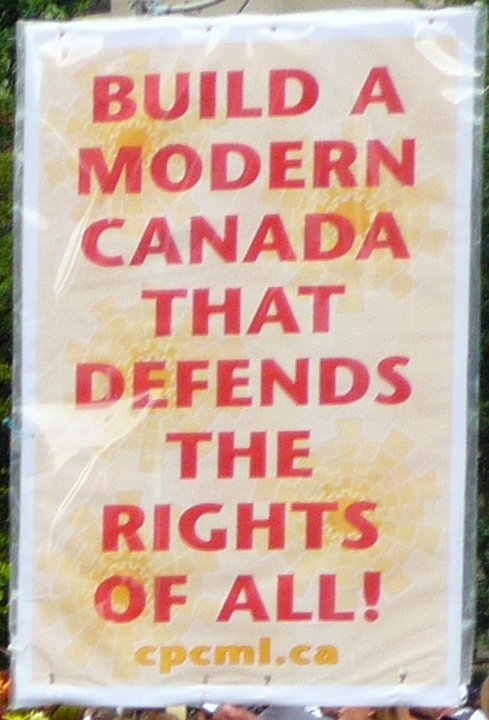 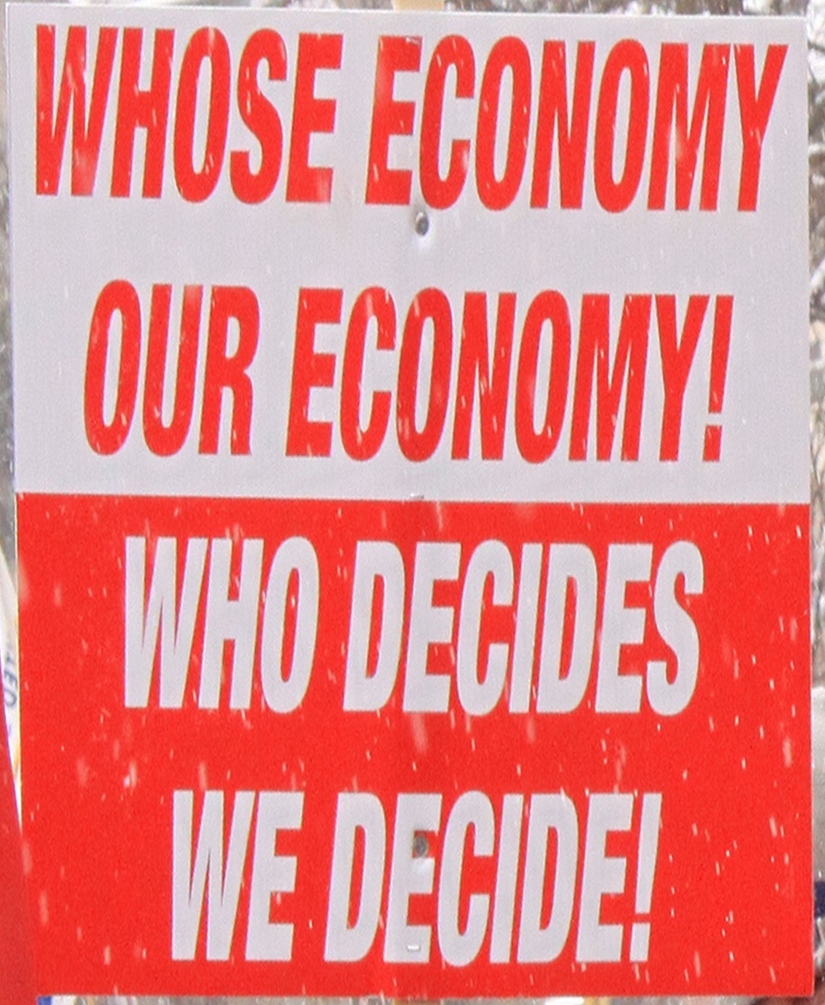 
• Federal
Funds to Import European
Cars Directly into British Columbia
• Port of Nanaimo to Be Marshalling
Area for Imported Vehicles
• Pay-the-Rich Corridors Projects in
Vancouver
Fifth Anniversary of
Lac-Mégantic Tragedy
• Hold Rail Monopolies and
Governments Accountable!
- Pierre Chénier -
July 1 Election in
Mexico
• Overwhelming Expression of
People's Desire for Change
- Claude Brunelle -
• Mexican People's Movement for Empowerment
- TML Weekly Correspondent -
Resistance Continues
to
Build in United States
• June 30 Demonstrations in Every
State Uphold the Rights of Immigrants, Refugees, Families and
Children
• Contending Authorities Contribute
to Civil War Danger
Second Anniversary of
Brexit Referendum
• Hysteria and Division Surround
Brexit Votes and Negotiations
• British Government Cannot
Reconcile Its Anti-Social and Pro-War Direction with the Needs of
the People
- Workers' Weekly -
National Trade Corridors Fund
Federal Pay-the-Rich Money Used to Further
Integrate Canada with Global Private Interests
- K.C. Adams -
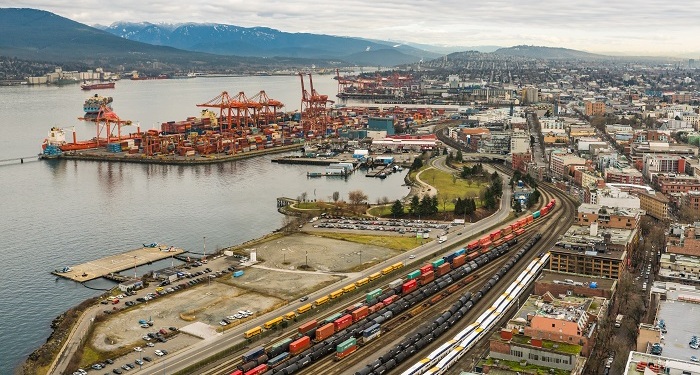
Port of Vancouver, rail lines in foreground.
Two private railways, Canadian National and Canadian
Pacific, are recipients of more than $200 million in federal
funds from Transport Canada's National Trade Corridors Fund. The
state money will be used to finance upgrades for the railways'
infrastructure serving the Port of Vancouver. Fixed value will be
added to the infrastructure owned and controlled by the private
railways CN and CP, both owned and controlled internationally,
mostly from the United States. The state pay-the-rich money
lowers the private investment of the private railways for their
fixed means of production used in operations. This effectively
raises the rate of profit for the owners of those companies.
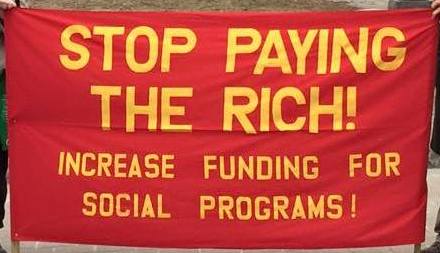
The state-funded infrastructure also serves importers
and
exporters involved in global trade. The federal Trade Corridors
funding of means of transportation out of and into the country
consolidates and strengthens the export/import direction of the
Canadian economy. This direction puts working people at the mercy
of the oligarchs in the global economy who buy the commodities
Canadians produce, in particular the country's raw material and
also certain goods such as vehicles. The heavy dependence on
international trade puts Canadians at risk, as can be seen with the
sudden downturn in the international oil sector in recent years[1] and the U.S. tariffs on softwood
lumber, steel and aluminum
and threats against vehicles assembled in Canada. Control over
the collective economic well-being and security of Canadians is
not in their own hands but dependent on the will of the global
oligarchs and their political representatives, such as the
President of the United States.
An economy dependent on exports and imports cannot
guarantee
the rights and well-being of Canadians and their control over
those affairs that affect their lives as the economy on which all
depend is in the hands of global oligarchs and what serves their
private interests. To achieve economic security of the people's
rights and well-being requires the development of a self-reliant
diverse economy that has as its base the circulation of
commodities within the country, especially those goods and
services that raise the standard of living, education and health
of Canadians. Exports and imports must serve the self-reliant
economy as something that adds strength to it through mutual
benefit and development of international trade with other peoples
and their states.
 Transport Canada's National
Trade Corridors Fund of billions
of dollars of pay-the-rich money is designed not to build a
self-reliant diverse economy but to serve the integration of
Canada's economy into the global imperialist system of states and
increase the control of the global oligarchs over Canada and
Canadians. Canada's resources and the work-time of Canadians are
being used in the violent competition of the international
cartels vying for domination of their sectors and beyond. The
competition of the oligarchs for control necessarily means
constant wars, destruction and insecurity. Transport Canada's National
Trade Corridors Fund of billions
of dollars of pay-the-rich money is designed not to build a
self-reliant diverse economy but to serve the integration of
Canada's economy into the global imperialist system of states and
increase the control of the global oligarchs over Canada and
Canadians. Canada's resources and the work-time of Canadians are
being used in the violent competition of the international
cartels vying for domination of their sectors and beyond. The
competition of the oligarchs for control necessarily means
constant wars, destruction and insecurity.
The pay-the-rich schemes further concentrate social
wealth,
power and privilege in the hands of the few at the expense of the
many. Only the organized and empowered working class determined
to defend the rights of all and build a modern self-reliant
nation can bring into being a new stable direction for the
economy. The time is now to get on with the task!
Stop Paying the Rich!
Increase Investments in Social
Programs!
Empower Ourselves Now to Take Control of Our Lives and
the Direction of the Economy!
Note
1. In concert with overt war and
conspiracies for regime change, the U.S. imperialists, following the
2008 economic crisis, decided to unleash a destructive economic war
against any state holding aspirations to use their oil resource as a
means to build a diverse and independent economy. The U.S.-led
imperialist front has set out to destroy or at least seriously disrupt
the economies of Russia, Venezuela, Brazil, Nigeria and Ecuador, and
also to intensify the pressure on Iran, Angola, Mexico, Canada,
Indonesia, Argentina, Norway and others. Canada's oil production,
particularly in the Alberta oil sands, has been severely affected.

Federal Funds to Import European Cars
Directly into British
Columbia

Port of Nanaimo
On June 20, the federal government announced a grant of
$6.3
million
from Transport Canada's National Trade Corridors Fund to build a
vehicle import
processing centre for the Port of Nanaimo on Vancouver Island.
The import processing facility for imported cars from Europe is a
joint venture with the private companies Western Stevedoring and
the automotive division of SSA Marine. FRS Capital Corp., a
global cartel headquartered in Seattle, owns and controls both
companies involved in the project.
According to the government announcement, the federal
money
will redevelop "the assembly wharf into a multipurpose terminal
that will house a 5,574 square metre import vehicle processing
centre, where cars coming to Canada from Europe will have work
done to meet Canadian standards -- 10,000 to 12,000 vehicles are
anticipated to be processed on an annual basis." No information
was provided as to who would run the facility once built but FRS
Capital Corp. through its subsidiaries runs port facilities throughout
the
world including the Vancouver Port.
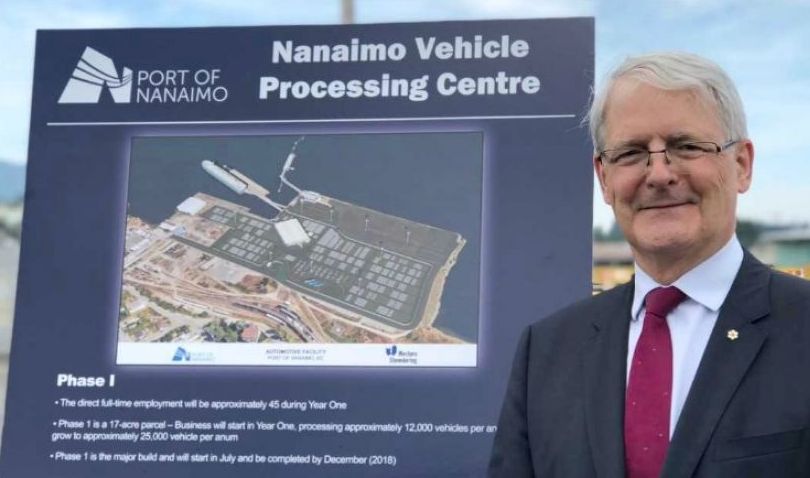 Federal Minister of
Transport Marc Garneau made the
announcement providing state money from the National Trade
Corridors Fund. In a press release, the government said the
project will improve Canada's supply chain for vehicles imported
into the country by addressing transportation bottlenecks. This
comes at a time of real concern over the security of vehicle
production in Canada. Federal Minister of
Transport Marc Garneau made the
announcement providing state money from the National Trade
Corridors Fund. In a press release, the government said the
project will improve Canada's supply chain for vehicles imported
into the country by addressing transportation bottlenecks. This
comes at a time of real concern over the security of vehicle
production in Canada.
Garneau says, "Individual projects are assessed on
their
merit and we found that this project had a high degree of merit
and we think that it will be good not only locally here, but it
will make our transportation system, with respect to imported
vehicles, more efficient."
How using state money to pay a foreign company to build
and
presumably operate a facility to import foreign made vehicles
helps the Canadian economy is not explained. This comes at a
particularly sensitive time of high anxiety when Canadian vehicle
parts and assembly plants, softwood lumber and aluminum
production and steelmaking are under threat from the United
States.
Canadians need to discuss an alternative direction for
the
economy that begins from building a self-reliant diverse Canadian
economy under their control. An economy should not and cannot
depend on international trade for its basic stability, security
and extended reproduction.
The federal government claims to be protecting the
national
interest and manufacturing by imposing retaliatory tariffs on
U.S. goods, yet uses public funds to expand vehicle imports from
Europe. This and other actions expose the liberals as
double-dealers opposed to building a stable, secure national
economy. Only with stability and diversity in the home economy --
especially in the basic sectors of manufacturing, extraction and
processing of raw material primarily for domestic use, public
services and social programs -- can Canada then engage successfully
in international trade with countries, if they so wish, based on
mutual benefit and development.
 Contrary to finding a new
direction for the economy, the
federal government has turned over international trading
relations to global cartels that are clashing with each other in
often violent competition for markets, raw material, cheap
workers to exploit and regions to control through predatory war.
The global cartels see the vast land of Canada as something to
exploit for its raw materials and a market to consume goods their
subsidiaries manufacture throughout the world. They oppose any
move towards the independent, diverse and stable development of a
self-reliant Canadian economy under the control of Canadians. Contrary to finding a new
direction for the economy, the
federal government has turned over international trading
relations to global cartels that are clashing with each other in
often violent competition for markets, raw material, cheap
workers to exploit and regions to control through predatory war.
The global cartels see the vast land of Canada as something to
exploit for its raw materials and a market to consume goods their
subsidiaries manufacture throughout the world. They oppose any
move towards the independent, diverse and stable development of a
self-reliant Canadian economy under the control of Canadians.
Global cartels completely control Canadian vehicle,
steel and
aluminum production, and most raw material extraction. This
leaves Canadian workers in those sectors and the entire economy
particularly vulnerable to ongoing intense competition among the
global oligopolies and their striving for hegemony.
The Trudeau and provincial governments see BC mostly as
a source of raw material extraction for
export and the lower mainland as a haven for oligarchs to park,
many say launder, their excess social wealth. The Trudeau
government is providing state money to increase the exportation
of raw material such as the Trans Mountain pipeline for raw
bitumen and the importation of manufactured goods including
European vehicles. Now is the time for a new direction for the
economy.

Port of Nanaimo to Be Marshalling Area
for Imported Vehicles
Michelle Corfield, Nanaimo Port Authority Chairwoman,
makes the dubious claim that the federally funded project,
built and presumably operated by a Seattle-based global cartel as
a marshalling yard for imported European vehicles is "locally
driven." How is this locally driven other than the work-time of
local workers? Everything associated with the project except the
work-time of local workers is not local at all and not something
that gives stability and security to the regional or Canadian
economy. Aside from the wages and benefits to local workers,
almost all the new value will be drained out of the BC economy
along with the money used to buy the vehicles. From the outset,
the federal government investment funds are to be handed over to
private interests from outside the region with the aim to import
cars manufactured in Europe. The only local aspect will be the
work-time of the Nanaimo working class.
 Councillor Ian Thorpe, who
is the acting Nanaimo Mayor,
jumped on the "jobs, jobs, jobs," bandwagon saying, "It's a
wonderful boost to our local economy, local jobs and it's exactly
what we need. It's more good news for Nanaimo." Councillor Ian Thorpe, who
is the acting Nanaimo Mayor,
jumped on the "jobs, jobs, jobs," bandwagon saying, "It's a
wonderful boost to our local economy, local jobs and it's exactly
what we need. It's more good news for Nanaimo."
It should be noted that the BC economy has virtually no
steelmaking and no vehicle manufacturing. The BC economy has
little manufacturing at all aside from the construction sector
and software development. The BC economy is heavily weighted
towards raw material extraction for export. The forestry sector
on Vancouver Island has been under terrible stress in recent
years with pulp and lumber mill closures.
For Your Information
The following are
excerpts from an April item in the Nanaimo Bulletin, "New European import
vehicle-processing facility planned for
Nanaimo assembly wharf -- Cars destined for BC dealerships to
be imported, processed and delivered through Nanaimo," with TML comments in
double
parentheses.
"Widening the Panama Canal has broadened industry and
job
opportunities for Nanaimo with a new automobile import and
processing facility that will start operations at the Nanaimo
Port Authority's Assembly Wharf in January.
"Nanaimo Port Authority, Western Stevedoring and its
affiliate organization, the automotive division of U.S.-based SSA
Marine, announced a joint venture [April 17] that will redevelop
the Nanaimo Assembly Wharf into a multipurpose terminal that will
be home to an import vehicle processing facility where cars
brought to Canada from Europe will have work done to meet
Canadian standards....
"Ewan Moir, Nanaimo Port Authority president and CEO
said,
'That [large warehouse] is the facility where the vehicles go in
and they are taken from being the standard-manufactured European
vehicle and -- I wouldn't say they're converted -- they're
morphed to become a Canadian vehicle. The French-English stickers
go on, the [GPS] software is updated with all the maps particular
to North America, any of the activities that are required in an
automobile to make them Canadian happen within the vehicle
processing centre.'"
((According to Moir, putting on French-English stickers
and
adding North American maps make the vehicles Canadian!))
"Having a centre in Nanaimo relieves distribution
problems
European manufacturers are experiencing by only being able to
land vehicles destined for markets across Canada at Halifax,
N.S., which means vehicles have to be transported by truck or
train to Canadian destinations. The multiple loading and
unloading stages can create time-consuming and expensive
logistical bottlenecks in the delivery process. Also, vehicle
dealers had complained about the cost of land on the Lower
Mainland to store inventory."
((This suggests the federally aided processing facility
in
Nanaimo will subtract employment in Halifax and elsewhere within
the Canadian economy, all to assist the importation of foreign
made vehicles into BC and the Prairies.))
"Marine shipping cars destined for the Island, Lower
Mainland
and Western Canadian dealerships directly from Europe to Nanaimo
became possible when the Panama Canal was widened, allowing large
vehicle transport ships to pass through it on their routes to
West Coast ports.
"Moir said the first phase of the project will use
about
seven hectares of assembly wharf land and start out processing
about 10,000 to 12,000 vehicles annually. The second phase of the
project will double the size of the facility, which could grow to
process up to about 40,000 vehicles annually as early as
2024.
"'The cars will be processed here in Nanaimo, then the
dealerships will have the cars that they're looking for for their
customers delivered back from Nanaimo to the Lower Mainland,'
Moir said."

Pay-the-Rich Corridors Projects in Vancouver
The Trudeau government's 2017 budget provided the
National
Trade Corridors Fund with $2 billion in available federal money
along with $5 billion from the Canada Infrastructure Bank, as
pay-the-rich schemes building infrastructure to facilitate trade
for the global oligarchs and military integration with the United
States.
The Port of Vancouver trade corridors projects
include:
- improving the existing Thornton Rail Tunnel
ventilation system so
that trains can pass through the tunnel more frequently;
- improving the rail corridor by building 5.5 kilometres of track
adjacent to the existing double-tracked corridor;
- designing and
raising Douglas Road so it crosses over the existing Canadian
National railway corridor, allowing trains to pass more often and
quickly;
- building 9.4 kilometres of new siding track and
reconfiguring train switching operations within the Canadian
Pacific railway corridor along the south shore of Burrard Inlet
in the cities of Vancouver and Burnaby;
- along with additional
investment from the Vancouver Fraser Port Authority -- a federal
agency -- designing and building a 4.2-kilometre long secondary
track for Canadian National parallel to the existing Burrard
Inlet line in the City of Vancouver; and
- to facilitate the
railway operations, building the Centennial Road overpass, a
600-metre long, two-lane elevated viaduct structure, extending
the existing two-lane Waterfront Road by 600 metres and
realigning 350 metres of Commissioner Street.

Fifth Anniversary of Lac-Mégantic
Tragedy
Hold Rail Monopolies
and Governments Accountable!
- Pierre Chénier -

July 6, 2018 marks the fifth anniversary of the
Lac-Mégantic tragedy, one of the worst train disasters in
Canadian history. On the evening of March 5, the Mégantic
community participated in a silent march that ended at the
cemetery where many of the victims of the tragedy are buried. On
the morning of June 6, a memorial mass was held, followed by the
inauguration of the "Espace de mémoire," a site for people to
gather and discuss what they have experienced since that fateful
night, as well as their future. The people of Mégantic have been
fighting without letup since the tragedy of July 6, 2013 to
rebuild their lives, which cannot be done without improved rail
safety. Early in May, the federal and
Quebec governments finally confirmed that a bypass track -- one of
the demands of the people of Lac Mégantic which the
governments
initially ignored -- would be built so that dangerous goods will no
longer be transported through the town's downtown core. Rail
communities affected by train
derailments, which continue to occur regularly across Quebec,
Canada and the United States, are greatly inspired by the
steadfastness of the Lac-Mégantic community backed by the people
of all of Quebec.
Five years ago, on July 5, a freight train comprised of
five
locomotives and 72 tanker cars unsuited for the type of crude oil
they carried, was left unattended for the night in Nantes, in
Quebec's Eastern Townships. At around 1:00 am on July 6, the
train started to roll down the slope towards the town of
Lac-Mégantic. Shortly after, 63 of the tanker cars derailed in
downtown Lac-Mégantic, spilling their contents and causing a
series of fires and explosions of catastrophic proportions.
Forty-seven people were killed and many others were injured.
Downtown Lac-Mégantic was destroyed. The Chaudière River
and the
lake itself were heavily contaminated by the crude oil spill. Many of
the town's residents continue to suffer from
post-traumatic stress related to the tragedy.
A large number of trains carrying crude oil have
derailed
since the Lac-Mégantic tragedy, including in Casselton, North
Dakota in December 2013; near Plaster Rock, New Brunswick in
January 2014; and in Gogama, Northern Ontario in March 2015. They
were all potential Lac-Mégantic disasters, with loss of life
avoided only because the derailments took place a few kilometres
away from a densely populated area.
 In a recent report on 2017
rail
accidents in Canada, the Transportation Safety Board of Canada (TSB)
informed
that in 2017, 1,091 rail accidents were reported to the TSB, a 21
per cent increase over the 2016 total of 900, and unchanged from the
previous 10-year (2007-2016) average of 1,092. In 2017, 115
accidents involved dangerous goods, up from 101 in 2016 and below
the 10-year average of 138. Four accidents resulted in a
dangerous goods release in 2017, up from one in 2016, and
consistent with the 10-year average. Rail fatalities totalled 77
in 2017, up from 66 reported in the prior year and comparable to
the 10-year average of 76. The number of main-track accidents
totalled 206 in 2017, up 18 per cent from 175 in 2016 and 9 per
cent above the 10-year average of 190. The main-track accident
rate in 2017 was 2.6 accidents per million main-track
train-miles, up 12 per cent from 2.3 in 2016 and 7 per cent above
the 10-year average of 2.4. Very disturbing also is the fact that
occurrences of run-away trains has increased by 10 per cent in
the last five years, most of them taking place in rail yards,
with some also occurring outside of the yards, including one near
Toronto in 2016, where a dangerously flammable liquid was part of
the convoy. In a recent report on 2017
rail
accidents in Canada, the Transportation Safety Board of Canada (TSB)
informed
that in 2017, 1,091 rail accidents were reported to the TSB, a 21
per cent increase over the 2016 total of 900, and unchanged from the
previous 10-year (2007-2016) average of 1,092. In 2017, 115
accidents involved dangerous goods, up from 101 in 2016 and below
the 10-year average of 138. Four accidents resulted in a
dangerous goods release in 2017, up from one in 2016, and
consistent with the 10-year average. Rail fatalities totalled 77
in 2017, up from 66 reported in the prior year and comparable to
the 10-year average of 76. The number of main-track accidents
totalled 206 in 2017, up 18 per cent from 175 in 2016 and 9 per
cent above the 10-year average of 190. The main-track accident
rate in 2017 was 2.6 accidents per million main-track
train-miles, up 12 per cent from 2.3 in 2016 and 7 per cent above
the 10-year average of 2.4. Very disturbing also is the fact that
occurrences of run-away trains has increased by 10 per cent in
the last five years, most of them taking place in rail yards,
with some also occurring outside of the yards, including one near
Toronto in 2016, where a dangerously flammable liquid was part of
the convoy.
The fact is that five years after the
Lac-Mégantic
tragedy, the
dangers to human life, property and the environment are even more
acute, due to the criminal negligence of the railway monopolies.
They claim their overriding responsibility and most urgent task
is to remain competitive with other carriers nationally and
internationally at any cost, with the government irresponsibly
refusing to hold them to account. They also claim more and more
that the human factor is the cause of accidents and tragedies and
that unless the process is 100 per cent mechanized, with no
workers involved, rail safety will continue to deteriorate and be
subjected to "human error."
This propaganda which blames workers for accidents,
criminalizes their behaviour and is used to promote
justifications which eliminate vast numbers of workers from their
workforces. These attacks actually reveal the anti-worker, anti-human
outlook of the rail monopolies and
governments who provide them with all the power to do as they
please. The new technology cannot make the railways safer so long
as the motive is private profit through the activation of the
anti-human factor/anti-consciousness. For example, the increase
in runaway trains coincides with the process of using
inexperienced people equipped with remote control belt packs
walking alongside trains to assemble and disassemble trains in
yards. Instead, this work should be done by experienced
locomotive engineers directing the operation from the locomotive
itself.
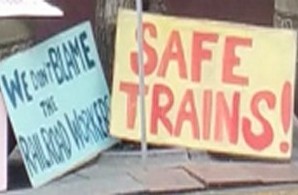
Rail monopolies such as CP are now putting extreme
pressure
on their office employees to become locomotive engineers. It
takes years of experience for workers to actually become
responsible locomotive engineers. Office workers are now being
called upon to participate in a training program with
state-of-the-art simulators reflecting the different situations
workers may find themselves in. Why not train the engineers in
these state-of-the-art technologies? A prejudice is pushed
against the older workers by claiming that the youth are better
suited to these technologies but none of this explains why the
development of new technologies are used to pit one section of
workers against another, engage in union busting and lower the
standard of living of all the workers and endanger the safety of
the workers and the public. These mostly office workers are being
trained and bullied into performing without the critical human
factor of the organized support of their fellow workers and their
unions. They report that they are very concerned that they are
being forced to drive long and heavy trains at fast speeds,
sometimes with dangerous goods on board, without proper human
support. Workers report several near misses that could have been
deadly, for themselves and the public, had an accident actually
occurred.
Another example of the pressures on the workers is the
fact that in the name of
"safety" some
of the rail monopolies in the U.S. are now using drones to spy on
railway workers while they are working, which is most unsafe as
workers are deprived of peace of mind and cannot focus on their
work.
Meanwhile, as these things are happening, the
governments at
the federal and provincial levels refuse to take the necessary
measures to restrict the ability of the rail monopolies to act in
this reckless way and attack the human factor. The more the
monopolies and the governments talk about the "sorrow" they feel
over the rail tragedies and claim they are taking "measures," the
more such talk is directly contradicted by the dictate they are
actually implementing. They place the private interests of the
rail monopolies above society where they cannot be held to
account except by a determined people organized for that purpose,
as in Lac-Mégantic.
Lac-Mégantic was a tragic and profound
eye-opener as to how
the neo-liberal outlook and practice of placing all of society's
assets at the disposal of the global monopolies directly led to
the self-regulation of the railways and to criminal negligence
causing death and chaos, as well as joint attempts by the private
owners and the government to blame the workers. The people of
Lac-Mégantic did not accept that and persisted in pursuing
immediate measures, which has culminated with the decision to
have tracks that by-pass the town. It is through such practical
politics that the highest standards of safety must be enforced in terms
of working conditions, required personnel,
maintenance and all other relevant aspects.
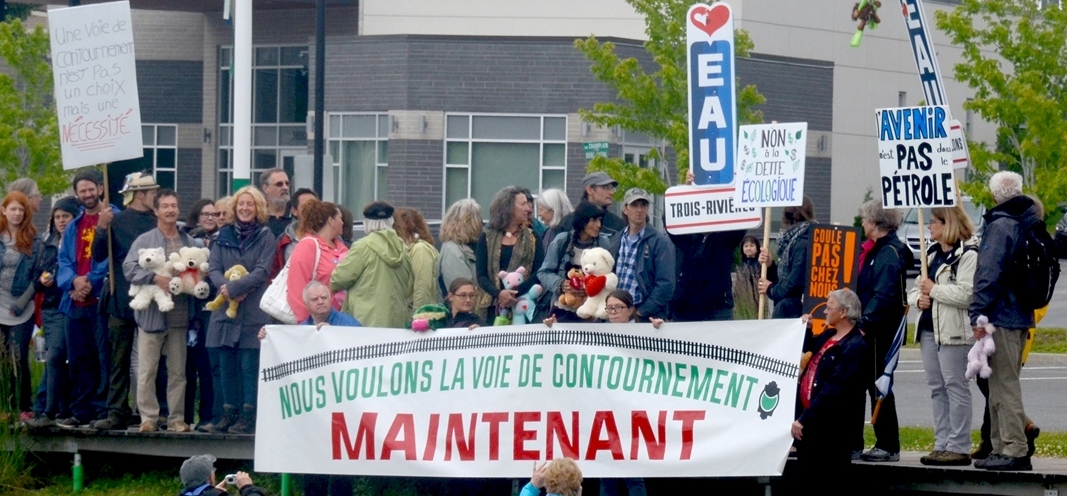
Banner demands that rail tracks bypass town as residents mark the third
anniversary of the tragedy, July 10, 2016.
The private rail monopolies and governments in their
service
are endangering the lives of the workers, the rail communities
and the public. It must not pass!
On this fifth anniversary of the Lac-Mégantic
tragedy, a warm
salute to the Lac-Mégantic community and all those in Quebec who
lost family and friends in that tragedy.

July 1 Election in Mexico
Overwhelming Expression of People's
Desire for Change
- Claude Brunelle -
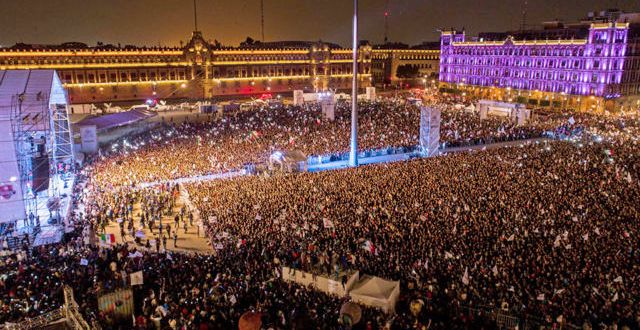
Victory celebration in Mexico City's main square, El Zócalo, on
election night, July 1, 2018.
In what has been referred to as an electoral tsunami, on
July 1 the Mexican people expressed their desire for change in an
overwhelming show of strength by electing Andrés Manuel
López Obrador (AMLO) and his Together
We Will Make History (Juntos Haremon Historia) coalition to the
Presidency of the Republic. Not only
did Mexican citizens favour AMLO for President, they also formed
an absolute majority in the two chambers of the Mexican Congress
by electing deputies and senators who were candidates of AMLO's
coalition made up of his National Regeneration Movement (MORENA) Party,
the Labour Party (Partido del Trabajo -- PT) and Social Encounter
Party (Partido Encuentro Social -- PES). In addition, the coalition won
five of the
nine governorships up for election.
The same phenomenon took hold across the country with
the election of mayors and councillors. More than 50 per cent of the
17,000 seats to be filled at this level of
government went to people associated with the Together We Will Make
History coalition.
In this way, more than 63 per cent of the close to 89
million
citizens who were registered to vote -- 45 per cent of them between 18
and 35 years of age, and many of them were new voters -- ended 78 years
of domination
by the Institutional Revolutionary Party (PRI), including 36
years of neo-liberal policies imposed on the Mexican people by the
PRI and the National Action Party (PAN).
 The extent to which the old
parties have destroyed the social
fabric, rubbing elbows with organized crime and imposing a policy of
fear, permitting kidnappings and assassinations of social and
community leaders, investigative journalists and local government
candidates to carry on with impunity, led the Mexican people to clearly
proclaim, Enough! The
people's action to realize their desire for change was such
that in the aftermath of the July 1 elections the PRI, PAN and their
allies -- for instance, the Democratic
Revolution Party (PRD), New Alliance (NA) and the Ecological Green
Party (PVEM) -- found
themselves completely decimated throughout the Republic. The extent to which the old
parties have destroyed the social
fabric, rubbing elbows with organized crime and imposing a policy of
fear, permitting kidnappings and assassinations of social and
community leaders, investigative journalists and local government
candidates to carry on with impunity, led the Mexican people to clearly
proclaim, Enough! The
people's action to realize their desire for change was such
that in the aftermath of the July 1 elections the PRI, PAN and their
allies -- for instance, the Democratic
Revolution Party (PRD), New Alliance (NA) and the Ecological Green
Party (PVEM) -- found
themselves completely decimated throughout the Republic.
In rejecting these parties, the people have rejected
the
anti-people and anti-national policies that have been their lot
for decades. Over the past 36 years, Mexican citizens have seen
their natural resources handed over to and pillaged by mining
companies -- most of them Canadian and to whom more than 25 per cent of
the national territory has been ceded as concessions made in violation
of the requirement for the free, prior and informed consent, and of the
ancestral rights of the Indigenous peoples
who live on these lands. The country's agriculture has been
destroyed to the extent that Mexico, which created different types of
corn, now has to import seeds from the
United States. Energy resources have all been privatized and
handed over to big foreign multinationals. The last resource to
be privatized was oil, always a source of pride
for Mexicans, which brought in revenues that assisted in
guaranteeing a modern education and health system for the people. From
being a producer country, Mexico has become an importer of refined
petroleum to the extent that, of the close to 850,000 barrels a day
required
for domestic consumption, it must now import more than 650,000
from the United States. What is more, Mexicans have had to deal with a
restructuring of state arrangements that has impacted labour
legislation, health, education, pensions, security and the
justice system, all in favour of the big multinationals and to the
detriment of the interests of the people.
The rejection of the old system is also, and above all,
the rejection of
a system of utter corruption and impunity of unimaginable
proportions, spread throughout all spheres of government and
public institutions at the federal as well as the state and local
levels. More than half the population is left in extreme poverty,
where human dignity is trampled in the mud and human life is
worth less than a handful of pesos.
It is therefore with eyes wide open that the Mexican
people
decided to show that they wanted change and opted for the national
project of AMLO, who has stated that he
will put an end to corruption, create jobs by developing an
economy based on national production, and, as soon as he takes
office in December, ensure a universal monthly pension for the
elderly, and provide education and work scholarships to the youth.
These are some of the measures he has announced, along with a foreign
policy based on non-intervention in the affairs of sovereign countries,
peaceful resolution of conflicts, and friendly relations with all
peoples and governments. Without a doubt,
in their efforts to bring about change, the people will most
certainly follow developments with a watchful eye.
Heartfelt congratulations to the fraternal people of
Mexico!
They have indeed expressed their desire for change in a decisive and
overwhelming way. It is their continued involvement in activating
the human factor/social consciousness which will continue to
bring that change about.


Mexican People's Movement for Empowerment
- TML Weekly Correspondent -
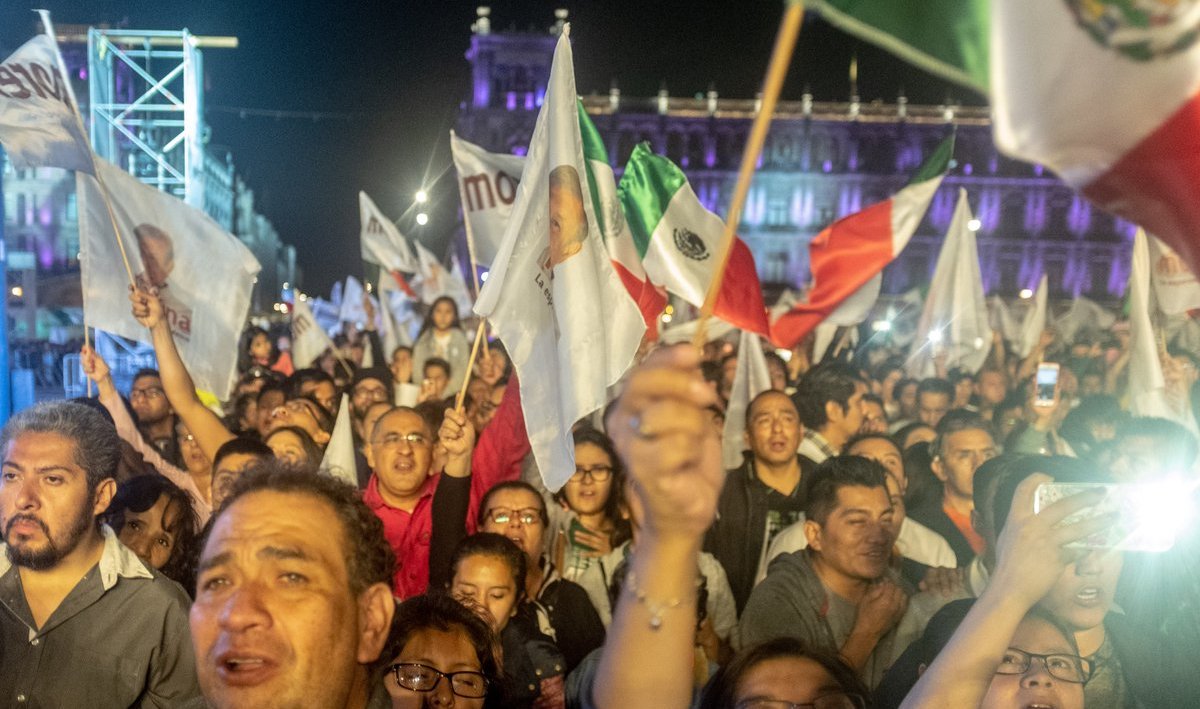
Celebration of election results in the streets of Mexico City on
election night, July 1, 2018.
While, in general, it was felt throughout the campaign
that Andrés Manuel López Obrador (AMLO) was heading for a
victory
in the presidency of the Republic, attracting thousands of people
every time he visited any of the country's major cities, what was
not expected was the depth of the people's expressed desire for
change throughout all levels of government,
federal, state and municipal.
At the level of the presidency, AMLO won 31 of
the 32
states of the Republic, with just over 24 million votes or 53 per
cent of the votes cast. The closest contender of the other three
candidates achieved just over 22 per cent. In the most
conservative states, such as Baja California and the northern states
such as Sinaloa, and even in the northeast with Nuevo León,
Mexicans overwhelmingly rejected decades of domination by the
Institutional Revolutionary Party (PRI) and the National Action
Party (PAN), with more than 60 per cent opting for the Together We Will
Make History (Juntos
Haremos Historia) coalition led by
AMLO's party, MORENA. Together We Will Make History is
made up of
MORENA, the Labour Party (PT) and the Social Encounter Party (PES).
Even in
the PRI strongholds, such as the
States of Mexico and Coahuila, citizens rejected the old parties,
casting hundreds of thousands of votes in favour of AMLO's
coalition.
The overwhelming vote in favour of Together We Will
Make History
completely changed the situation in the two chambers that make
up the Mexican Congress. Before the July 1 election, the
distribution of seats in the Senate was as follows: PRI 55, PAN
34, PT 19, PRD 7, Independents 7, PVEM 6.[1]
With the July 1
election, the
new Senate will be comprised as follows: MORENA 55, PAN 24, PRI
13, PRD 8, MC 7, PES 7, PVEM 7, PT 6, PANAL 1. This gives the
majority to the Together We Will Make History coalition, with
68 senators out of a total of 128. The same scenario is repeated
in the House of Representatives, in which, before the election,
the representation was: PRI 204, PAN 107, PRD 53, MORENA 47, PVEM
38, MC 21, NA 12, PES 12, SP 5, Independent 1. The new representation
will be: MORENA 191, PAN 82, PT 61, PES 55, PRI 45,
MC 27, PRD 21, PVEM 16, PANAL 2, This gives the Together We Will Make
History coalition an absolute majority, with 307 deputies out of
a total of 500.
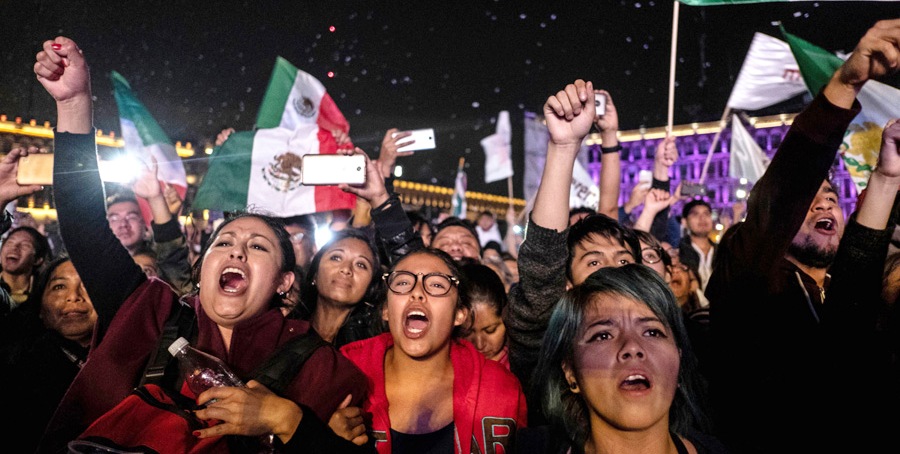
The desire for change was also evident in the election
of
governors of the eight states and the head of government in the
case of Mexico City which was recently elevated to the rank of Member
State of the Republic, whose governing bodies were up for renewal in
this election. Five of the nine posts were won by
AMLO's coalition -- Tabasco, Mexico City, Chiapas, Morelos and
Veracruz. It is probable that the state of Puebla will also tip
to the side of the coalition because of the exposure of a massive
fraud. It should be noted that winning Veracruz, the state
considered the granary of Mexico with its extensive production
of citrus, coffee and sugar cane, as well as oil, puts an end to
its domination for more than 78 years by the anti-people politics
of the PRI.
The determination of the people to
reject decades of threats, assassinations, corruption and fear
campaigns also extended to the majority of governments at the
local level, both in the north and south of the country, giving
control over legislative power to MORENA and its coalition in the
states of Mexico, Oaxaca, Veracruz, Sinaloa, Michoacán,
Guerrero,
Durango, Baja California Sur, and in more than half of the
country's municipal councils. In other words, the northern states
with their high concentration of mining, industrial and beef
production, as well as the southern and southeastern states
with extensive oil, coffee and food production have said, No!
to the continued contempt for the people of the PRI and the PAN,
and expressed their desire for change. Eloquent examples testify
to this determination to break with the past, such as in the
Mezquital community in the extreme south of the state of Durango,
where Indigenous peoples of the region walked
their donkeys for kilometres through the mountains with the
electoral material, not hesitating even to swim across rivers to ensure
that the population could exercise their
right to vote freely. Or the thousands of calls that families
made from one state to another to remind everyone of the
importance of voting to end 78 years of the PRI's domination over the
country.
The state capitals and large cities of the country were
not
spared by this wind of the will of the people for change. In fact, 11
capital
cities from north to south opted for the Together We Will Make History
coalition, including La Paz, Tuxtla Gutiérrez, Toluca, Morelia,
Cuernavaca, Oaxaca, Culiacán, Hermosillo, Villahermosa and
Zacatecas, as well as the major cities of Acapulco and Ciudad
Juárez, on the border with the United States, and infamous for
the kidnappings, rapes and mass murder of women in the
region.
This tidal wave of change also manifested itself in the
capital of the Republic with the election of the MORENA-led
coalition candidate, Claudia Sheinbaum, as head of government,
and 11 of the 16 borough councils that are part of
Mexico City.
The fact that more than 63 per cent of the
approximately 89
million citizens with the right to vote did vote, despite the
high level of violence characterized by more than 100
assassinations of candidates and social leaders in recent months,
or the hundreds of letters from large companies sent to thousands
of workers to intimidate them by threatening an economic
catastrophe and job losses if they did not vote the right way --
to mention only a few challenges -- demonstrates the
daring of the Mexican people and how much they were willing to risk to
declare through their
vote: Enough is enough, a change is
needed.
In this respect, participation was not limited to
the
electorate going out to vote. It was also manifested through
people taking action to ensure that attempts at electoral fraud were
defeated and their vote was respected. More than 3 million
citizens, including hundreds of thousands of young people,
responded to the call of the political parties to act as their
representatives in the polling stations. Add to that the 350,000
citizens of all ages who agreed to be official clerks of the
National Electoral Institute for the election. This was a real
citizens' movement from one end of the country to the other that
arose in the spirit of a great sense of responsibility and concern to
affect the future of the country as much as possible. It is this
preoccupation, characterized by a deep love for the country, that
could be felt throughout the Republic.
Note
1. The political parties are:
MC, Movimiento Ciudadano (Citizens' Movement)
MORENA, Movimiento de Regeneración Nacional (National
Regeneration Movement)
NA, Nueva Alianza (New Alliance)
PAN, Partido Acción Nacional (National Action Party)
PANAL, faction of the Partido Nueva Alianza (New Alliance Party)
PES, Partido Encuentro Social (Social Encounter Party)
PRD, Partido de la Revolución Democrática (Democratic
Revolution Party)
PRI, Partido Revolucionario Institucional (Institutional
Revolutionary Party)
PT, Partido del Trabajo (Labour Party)
PVEM, Partido Verde Ecologista de Mexico (Ecological Green
Party of Mexico)
SP, Sin partido (no party affiliation)

Resistance Continues to Build in United
States
June 30 Demonstrations in Every State
Uphold the Rights of
Immigrants, Refugees,
Families and Children
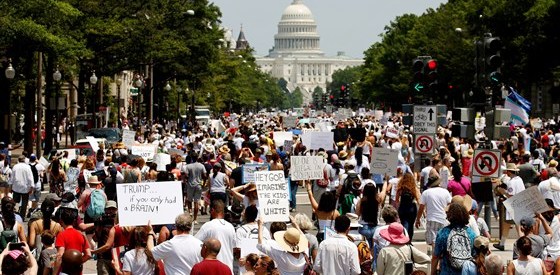
Washington, DC
Hundreds of thousands of people from all walks of life
joined demonstrations all across the United States on June 30,
affirming the human rights of children, refugees and immigrants
and rejecting the government's brutal and wholesale attacks on
them. Everywhere the stand was clear: Separation
of
Families
is
a
Crime
Against
Humanity;
Separation
is
Child
Abuse;
Children
Are
Not
Criminals;
No
Human
Being is Illegal; Asylum Is a Right;
Reunite Families NOW! Stop Government Terrorizing of Families;
Detain Trump, Not Children; Caging Children Is a Crime; No
Concentration Camps; End Detention.
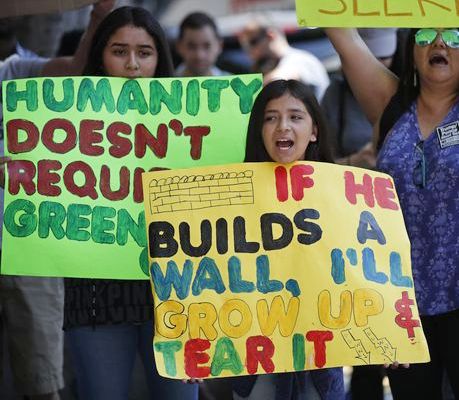 Many families participated
with their young children, who
often made the signs. From Juneau, Alaska to Orlando, Florida,
people in large united actions in cities and towns, large and
small, took their stand. More than 35,000 marched in Washington, DC,
30,000 in
New York City, 60,000 in Chicago and 70,000 in Los Angeles, with
more than 750 actions in all. More than 180 organizations
participated in mobilization. Many families participated
with their young children, who
often made the signs. From Juneau, Alaska to Orlando, Florida,
people in large united actions in cities and towns, large and
small, took their stand. More than 35,000 marched in Washington, DC,
30,000 in
New York City, 60,000 in Chicago and 70,000 in Los Angeles, with
more than 750 actions in all. More than 180 organizations
participated in mobilization.
The many immigrant and refugee families directly
impacted
played a main role in organizing and participating in the
actions, standing unafraid and demanding justice. Women and young
girls played an important role. So too did large numbers of
workers, including steelworkers, healthcare workers, teamsters,
and many others. As one organizer put it, he'd never seen so many
people from diverse backgrounds come forward to defend immigrant
and refugee rights. The disinformation spread with the Trump election
that "white workers" are backward, racist
supporters of Trump and government brutality, was exposed. The
united stand of all -- from the many nationalities making up the
single U.S. working class -- was clear: These attacks are
unacceptable and we will not be silent!
Not Our President, Not Our America, Not Our Democracy
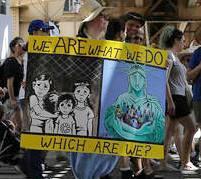 Another feature of the many
actions was the stand that
basically two Americas are contending: one represented by
the rulers and their representative Trump, and the other of the people,
represented by their many organized actions of all kinds --
demonstrations, meetings, petitions, and more. Many of the signs
in different places reflected this battle: This is Not Who We
Are or Should Be; Chaining Babies Not My America; We Are What We
Do, Which Are We (with two pictures, one jailing children and
one welcoming refugees). Since the Trump election, which was and
has been broadly opposed by the large majority, the view that the
country is headed in the wrong direction and one that is harmful
to the people here and abroad, has grown. As many put it: Not Our
President, Not Our America, Not Our Democracy. Another feature of the many
actions was the stand that
basically two Americas are contending: one represented by
the rulers and their representative Trump, and the other of the people,
represented by their many organized actions of all kinds --
demonstrations, meetings, petitions, and more. Many of the signs
in different places reflected this battle: This is Not Who We
Are or Should Be; Chaining Babies Not My America; We Are What We
Do, Which Are We (with two pictures, one jailing children and
one welcoming refugees). Since the Trump election, which was and
has been broadly opposed by the large majority, the view that the
country is headed in the wrong direction and one that is harmful
to the people here and abroad, has grown. As many put it: Not Our
President, Not Our America, Not Our Democracy.
This is a serious problem for the rulers to maintain
their
rule. The U.S. state demands a passive and pliant population at
home so as to better wage war abroad while increasing repression
and impunity at home. Immigration is one of the fronts where the
rulers are striving to have people identify with them and what
they put forward as the national interest. All are to support the
notion that the border must be militarized, families and
communities terrorized, and children criminalized, in the name of
protecting the national interest or national security.
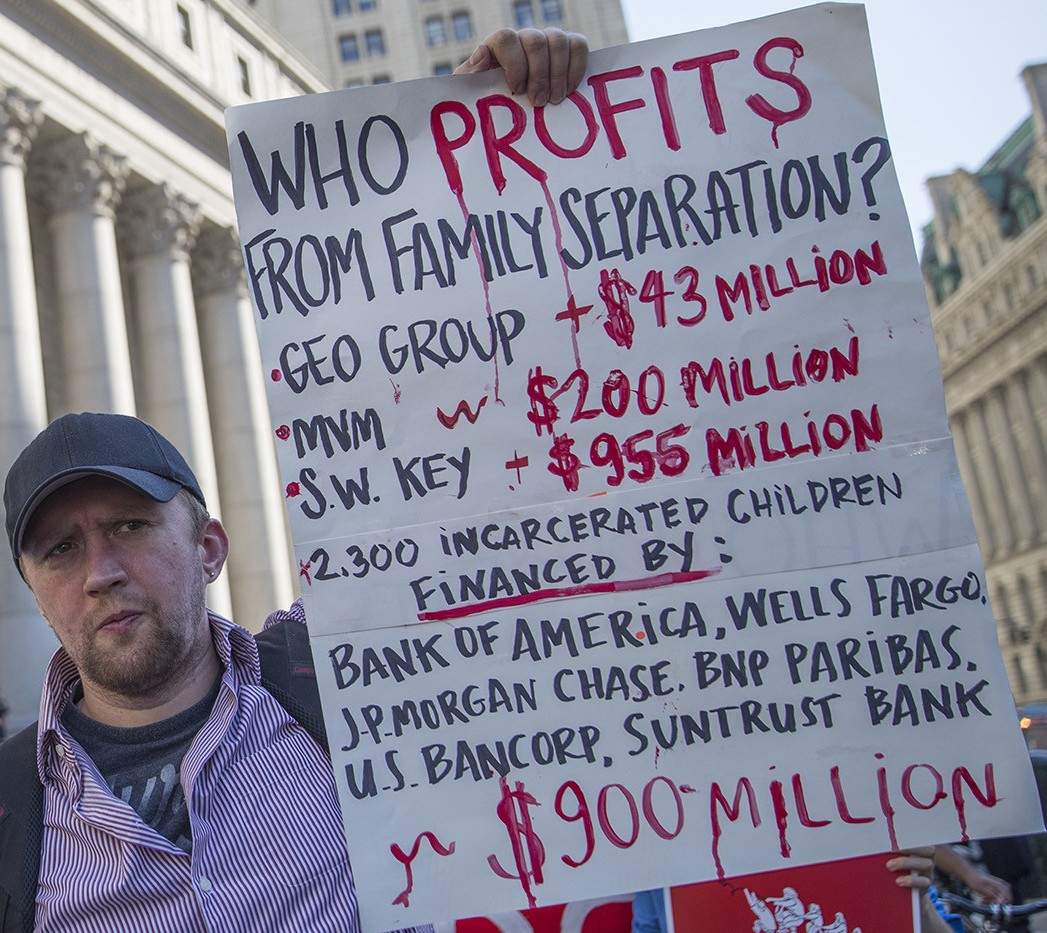 The Supreme Court recently acted as
an arm of the executive
in pushing this same view by ruling 5-4 that the executive imposed
ban on Muslims is part of exercising the president's authority
to protect the national interest. The rulers need people to
identify with the national interest as determined by them. They
most certainly do not want the people to instead identify with
their own interests -- the individual, collective and the general
interests of society -- such as defending the human rights of all
at home and abroad. They do not want people to envision a society
in the image of the working class, with its identity that is
pro-social, pro-equality, and pro-empowerment. So every effort is
being made to divide, divert, and block the people from
advancing the struggle for the rights of all. The June 30
demonstrations, like those of the students before them, are all
indicating that the people will not accept the backward direction
of the rulers and are striving to themselves be the decision-makers --
to have a country that serves their interests and those
of all humanity. The Supreme Court recently acted as
an arm of the executive
in pushing this same view by ruling 5-4 that the executive imposed
ban on Muslims is part of exercising the president's authority
to protect the national interest. The rulers need people to
identify with the national interest as determined by them. They
most certainly do not want the people to instead identify with
their own interests -- the individual, collective and the general
interests of society -- such as defending the human rights of all
at home and abroad. They do not want people to envision a society
in the image of the working class, with its identity that is
pro-social, pro-equality, and pro-empowerment. So every effort is
being made to divide, divert, and block the people from
advancing the struggle for the rights of all. The June 30
demonstrations, like those of the students before them, are all
indicating that the people will not accept the backward direction
of the rulers and are striving to themselves be the decision-makers --
to have a country that serves their interests and those
of all humanity.
The existing democracy clearly does not provide for
this
and
indeed no longer functions. Conditions are making clear that a
new democracy of our own making is required. The fact that
hundreds of thousands have expressed their determination to take
the country in a different direction twice in the last three
months is an indication that such a democracy can and must be achieved.
June 30 Actions Across U.S.
Washington, DC
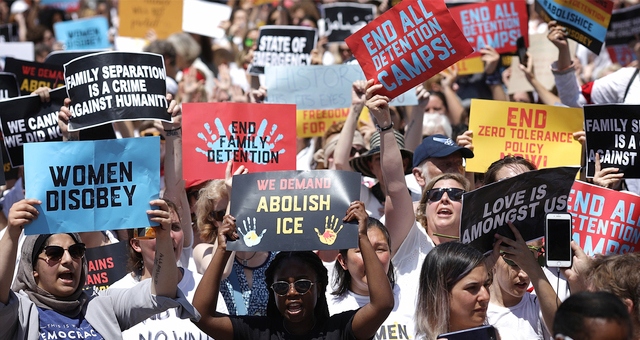

Portland, Maine

Boston, Massachusetts
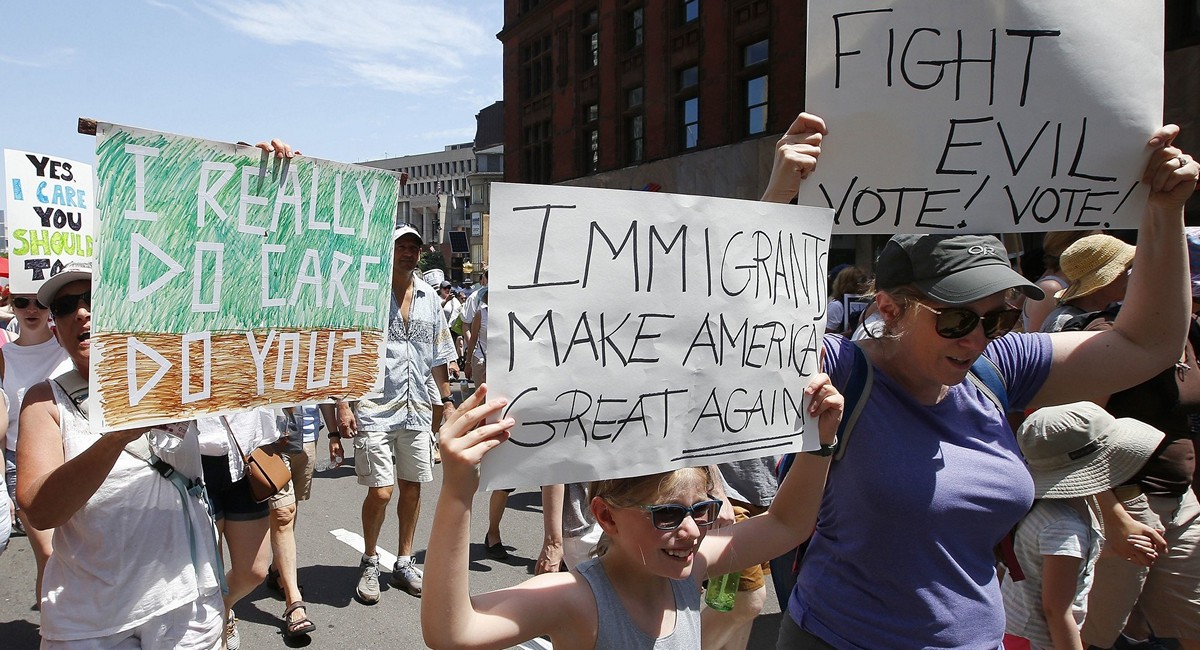
Stamford, Connecticut
   
Greenwich, Connecticut
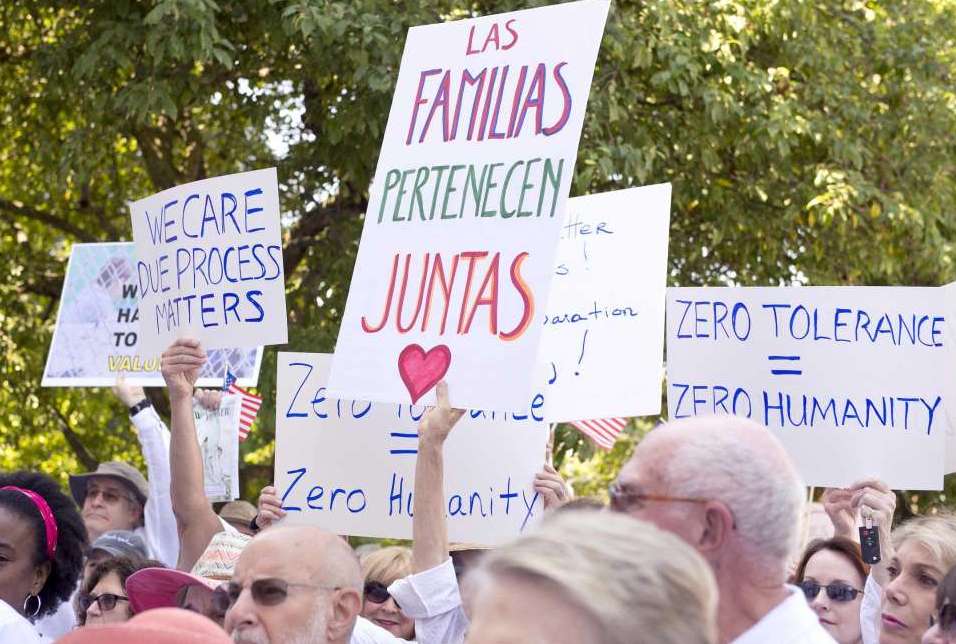 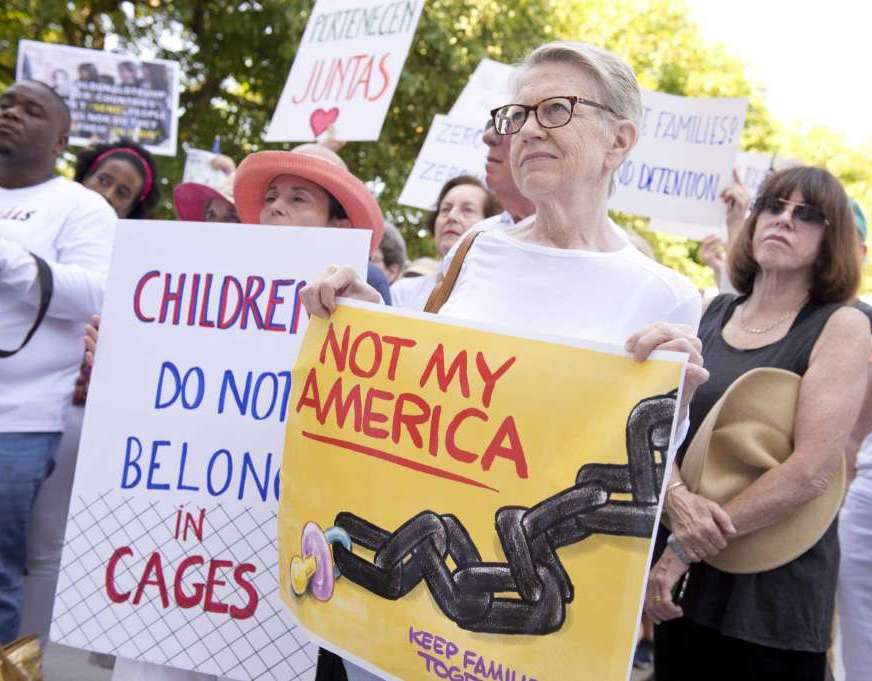
Newark, New Jersey
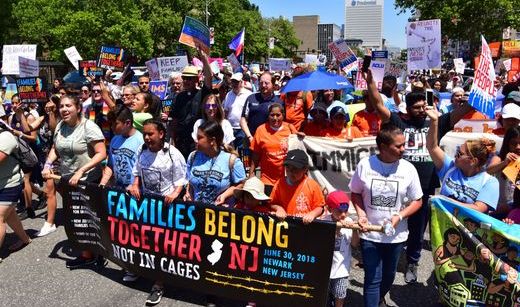
New York City
 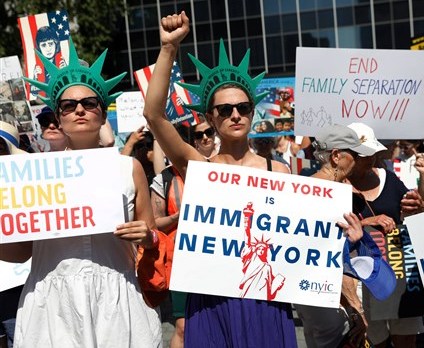
Dayton, Ohio
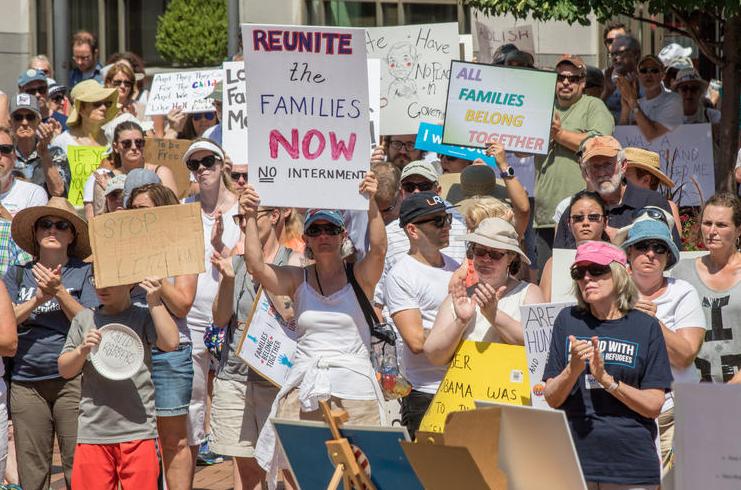 
Chicago, Illinois
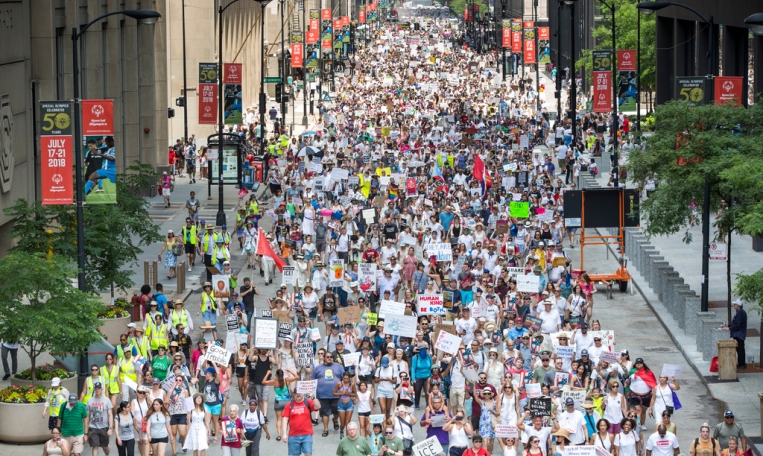
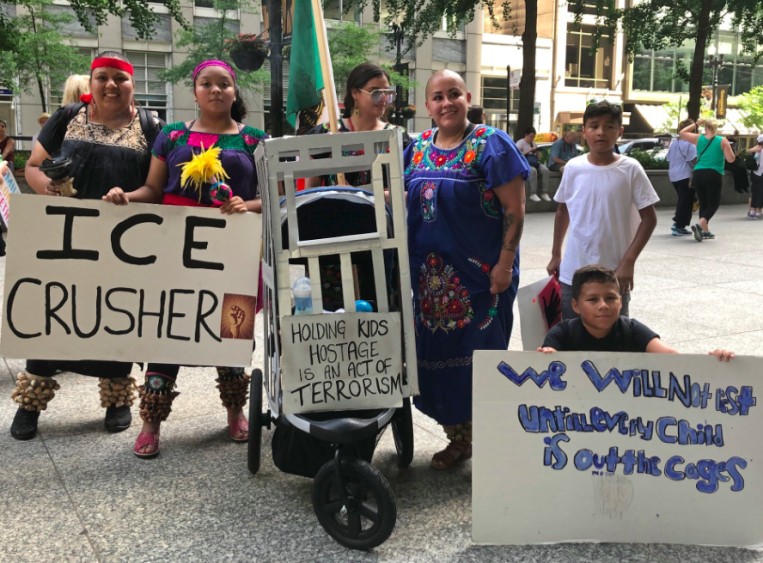 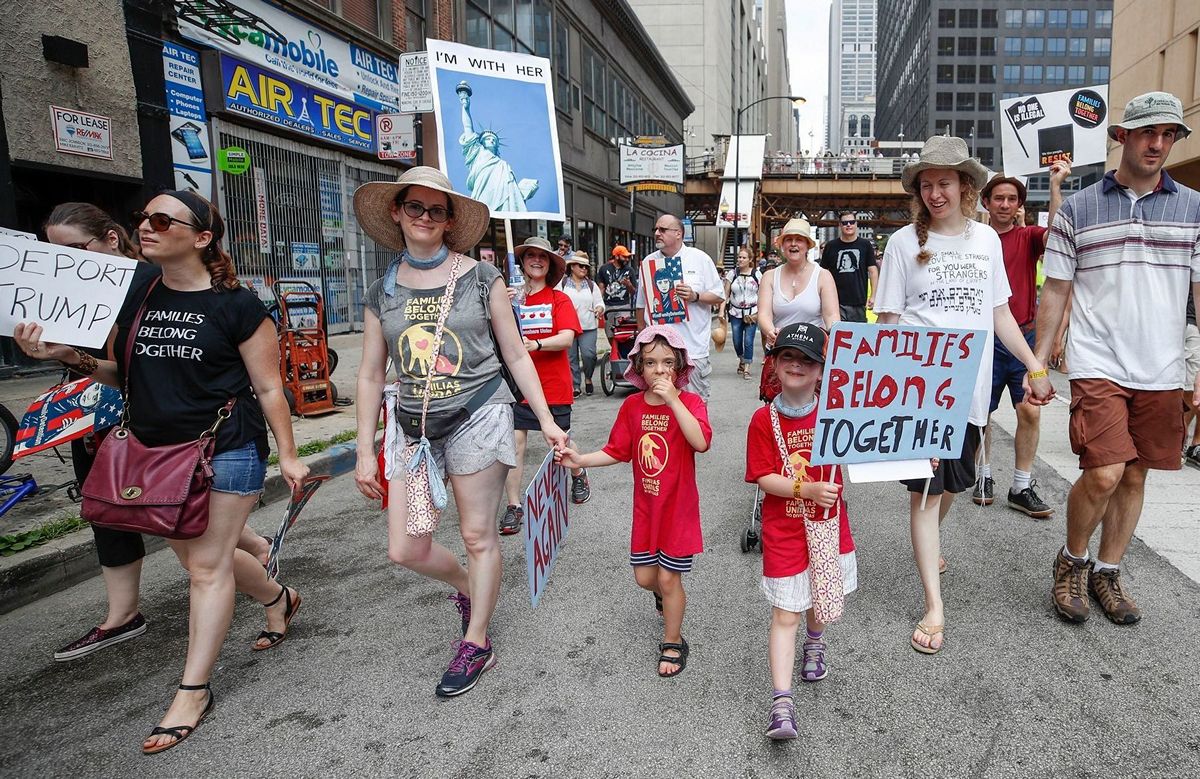
Minneapolis, Minnesota
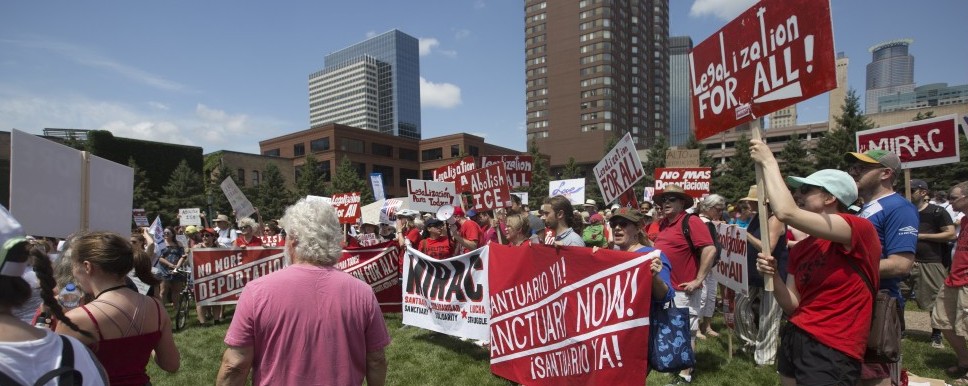
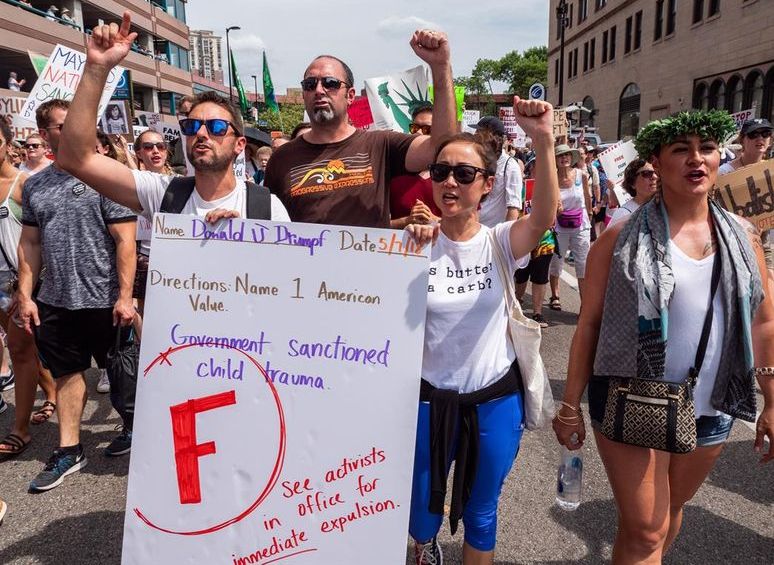 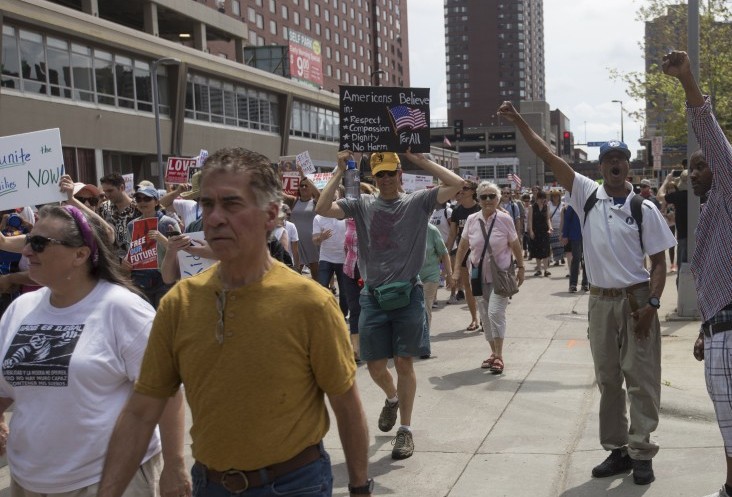
Indianapolis, Indiana
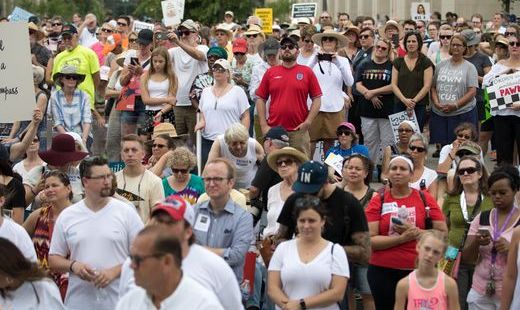 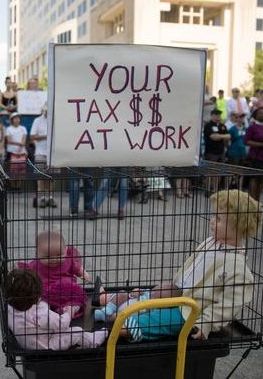
Jackson, Tennessee
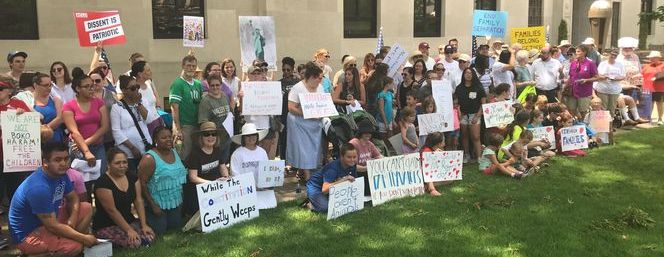
Atlanta, Georgia
  
Tupelo, Mississippi

Kansas City, Missouri; Dodge City, Kansas
 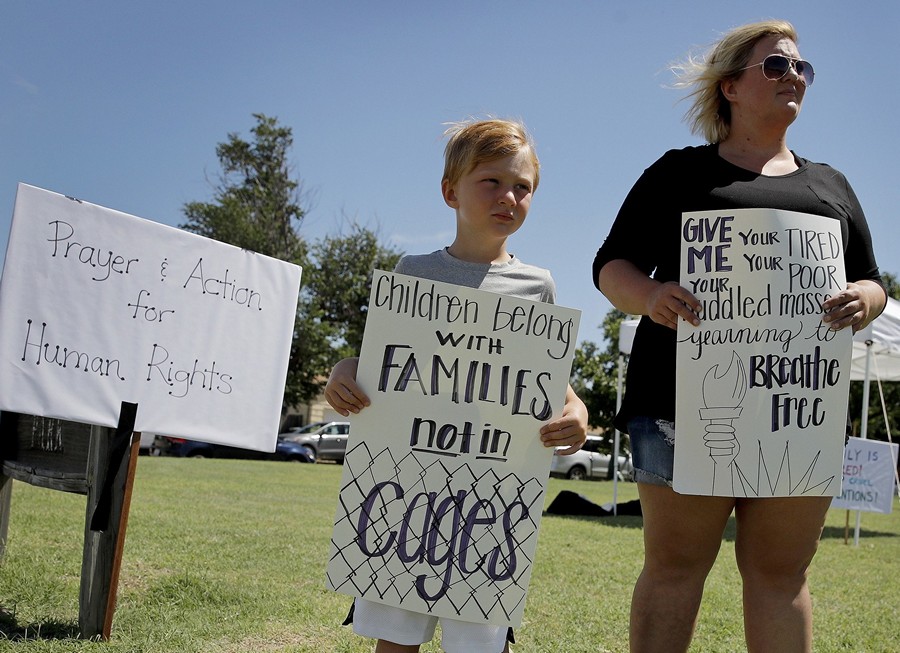
Houston, Texas
 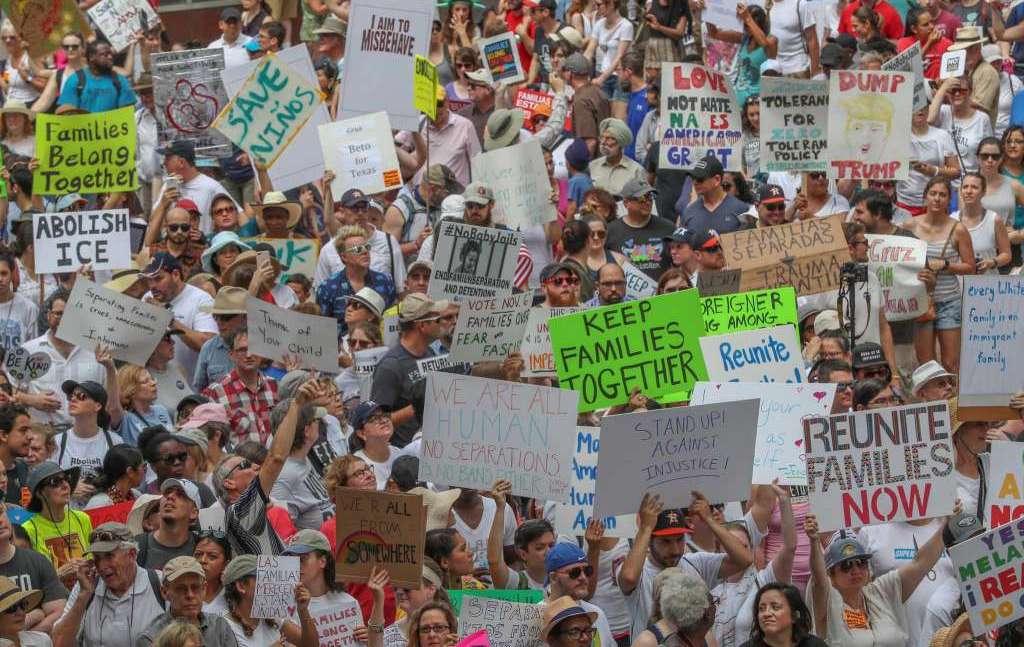 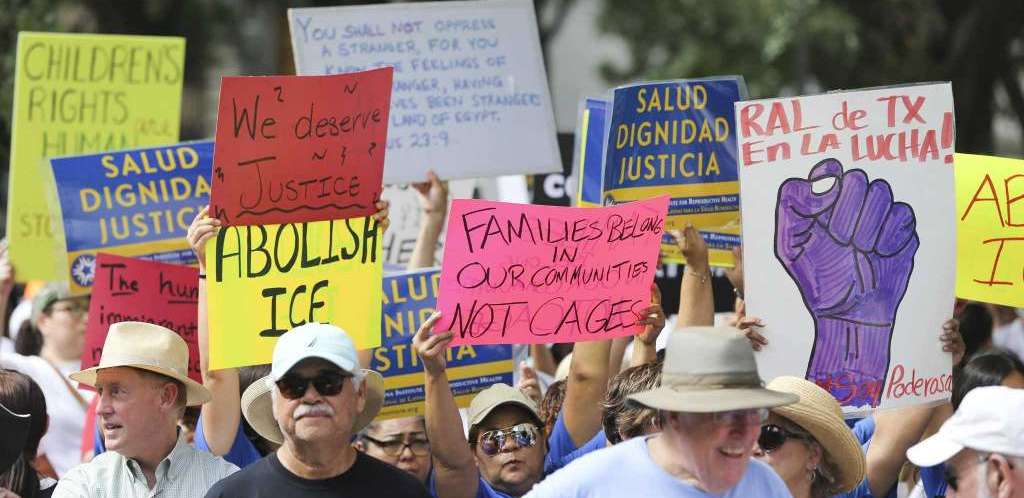
Austin, Texas; Brownsville, Texas
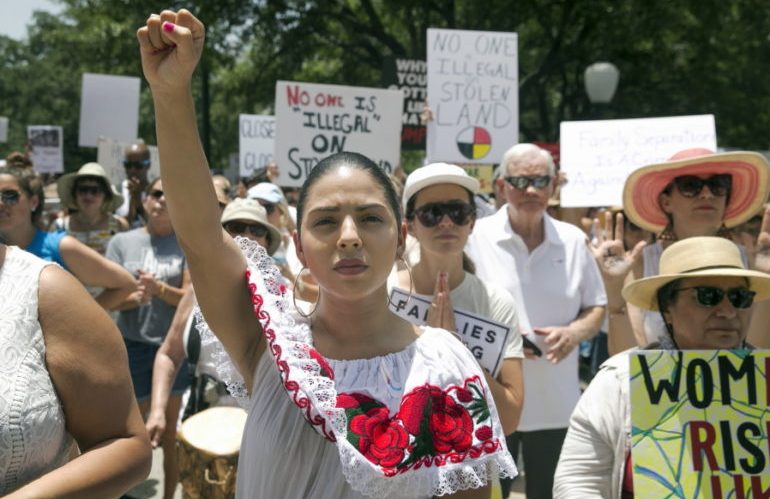 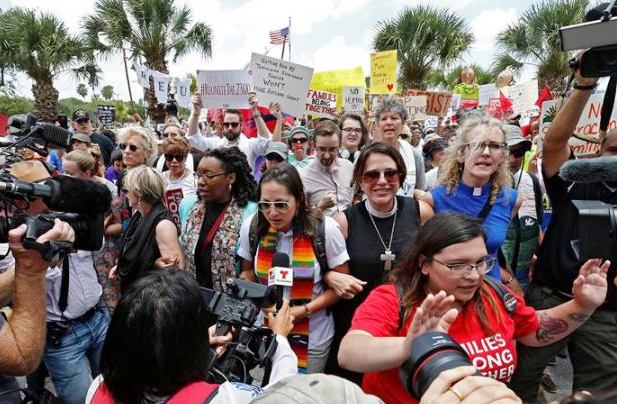
Nogales, Arizona

Los Angeles, California
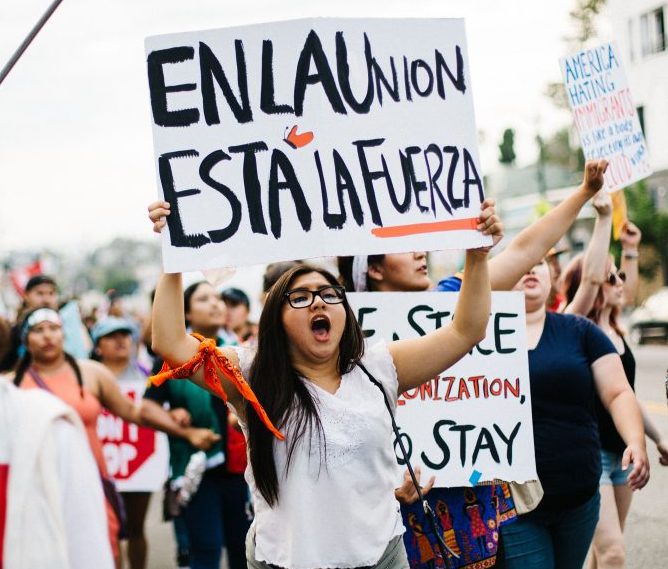 
San Francisco, California
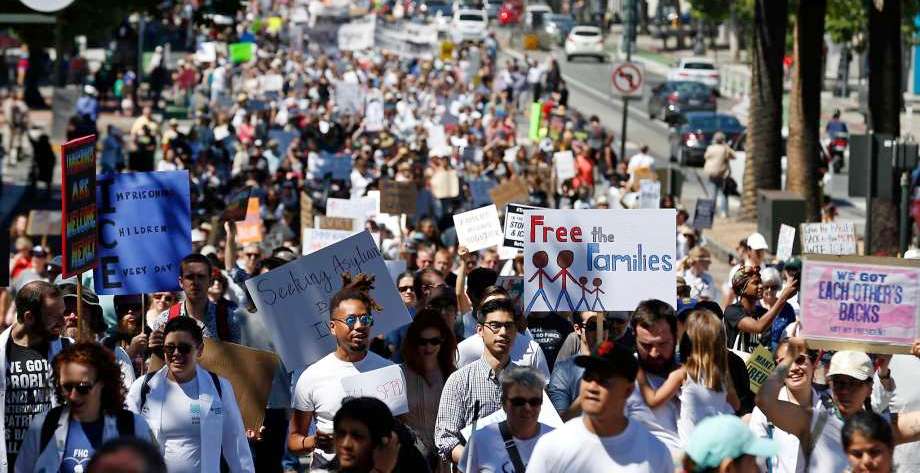 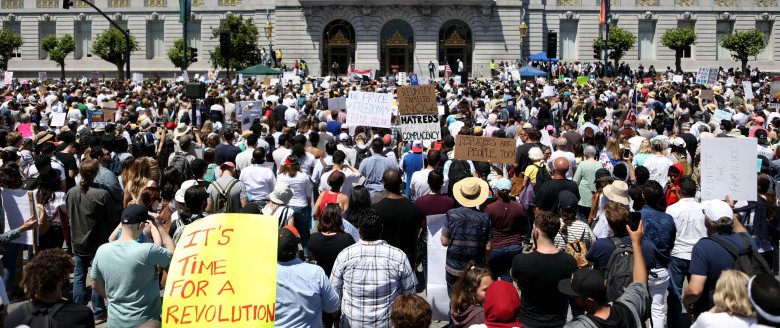 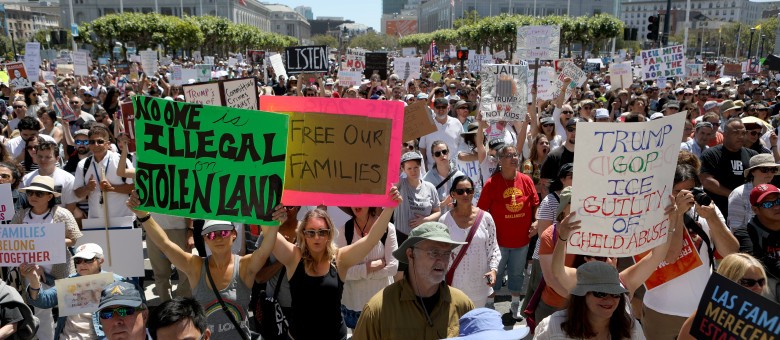
Oakland, California
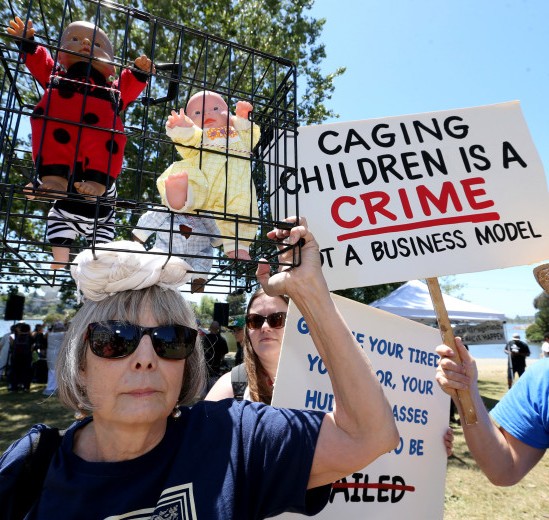 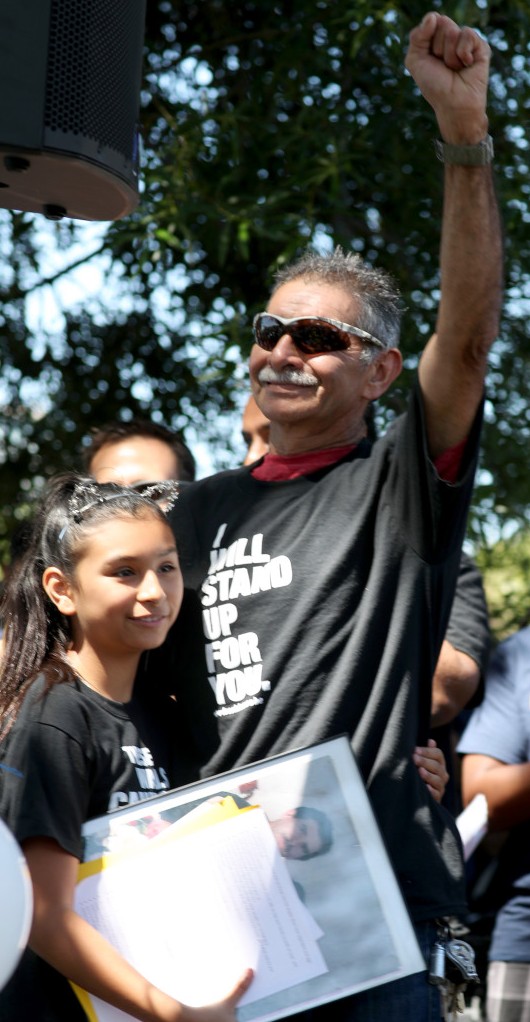 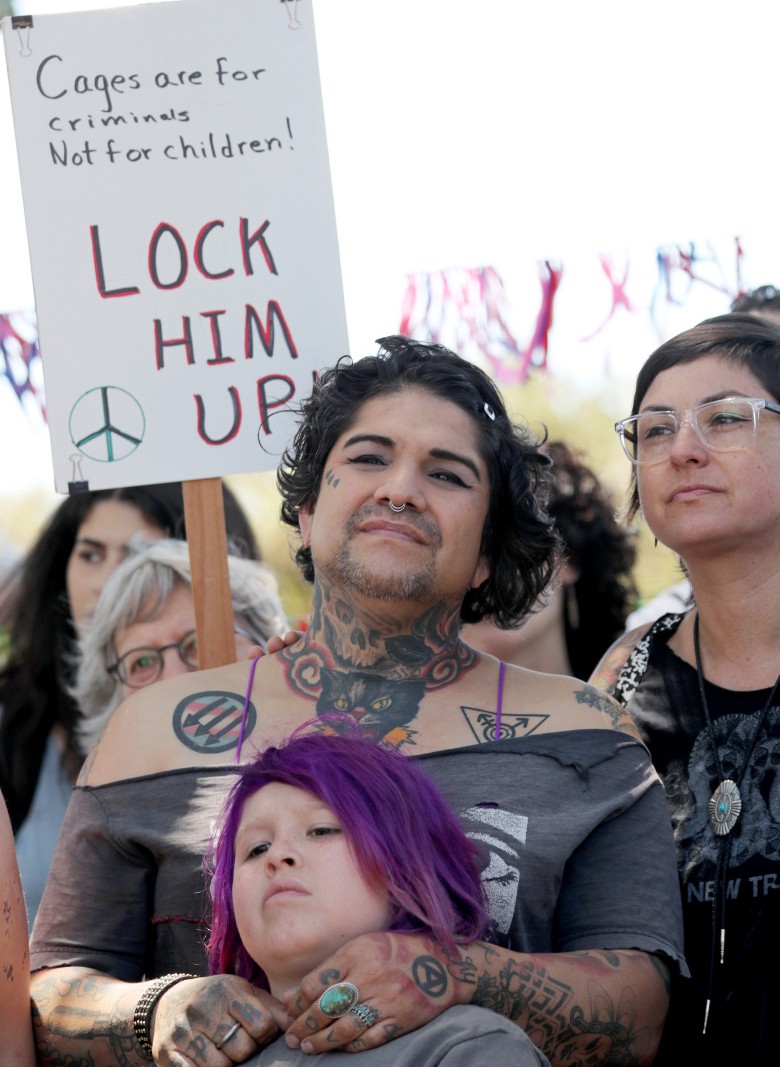
Santa Maria, California
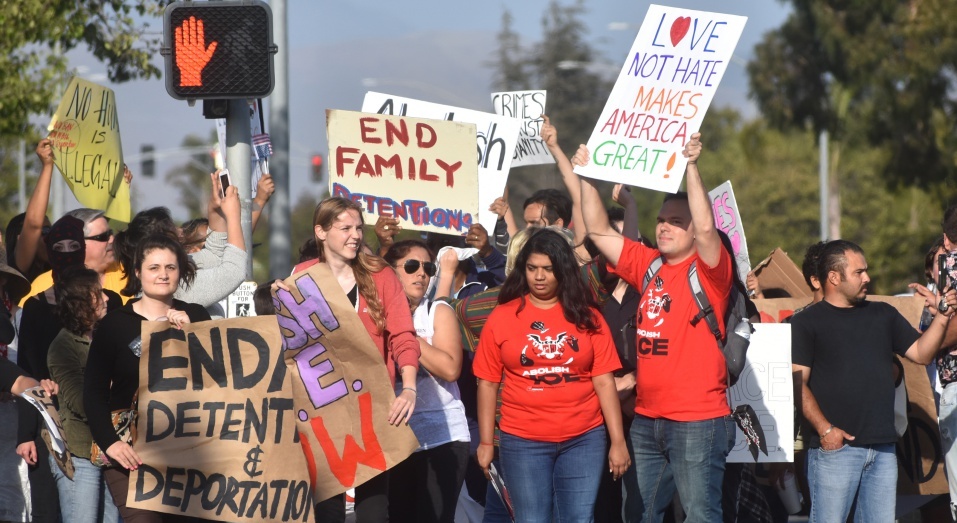
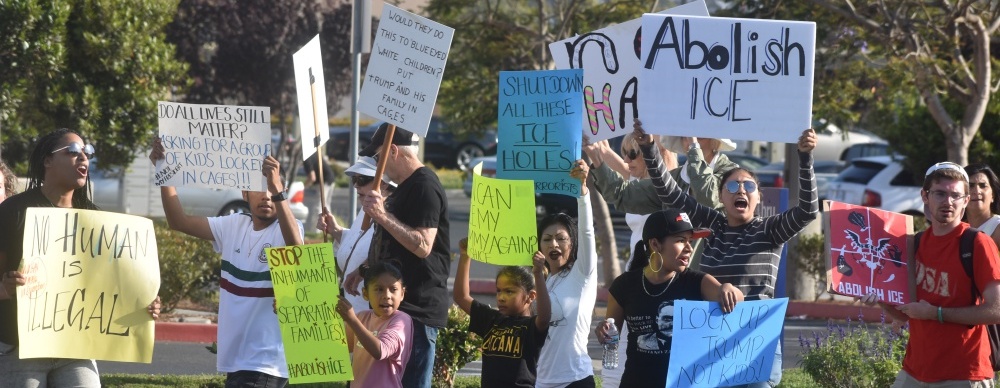
San Jose, California
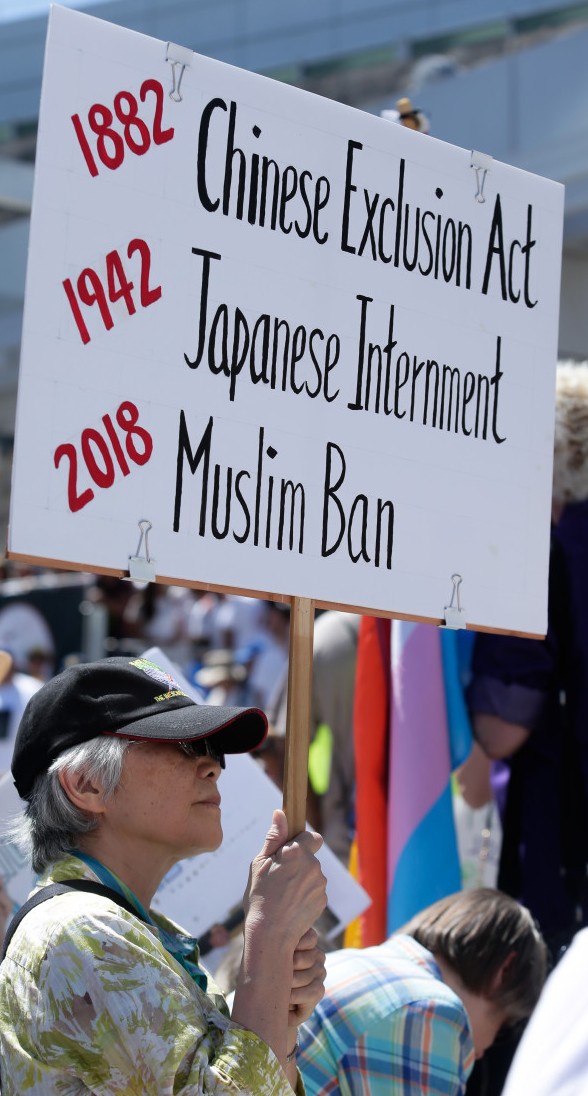 
Portland, Oregon
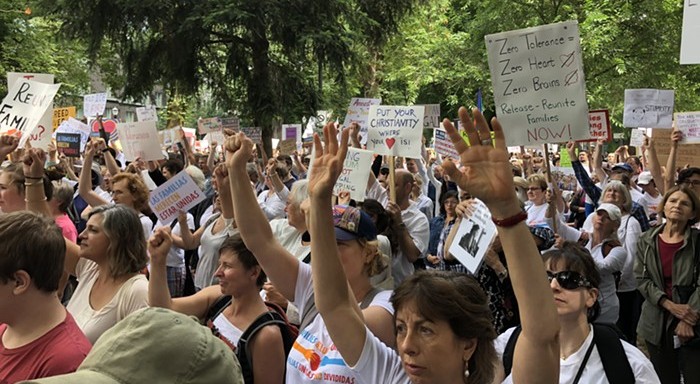 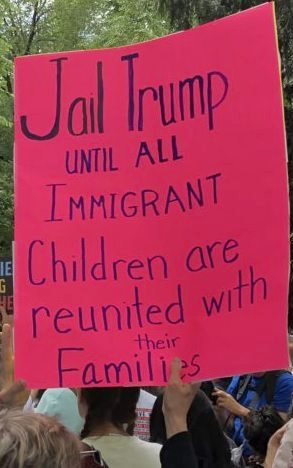
Edmonds, Washington
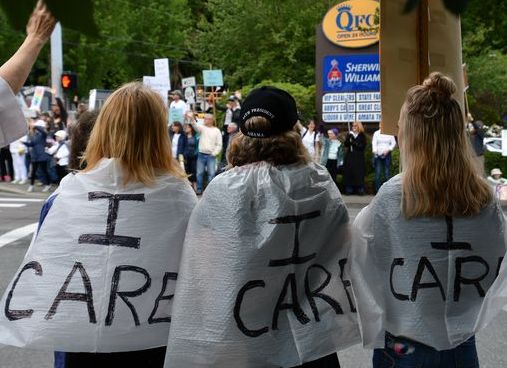 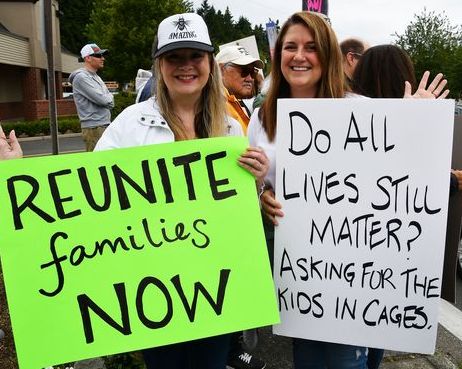
Spokane, Washington

Juneau, Alaska
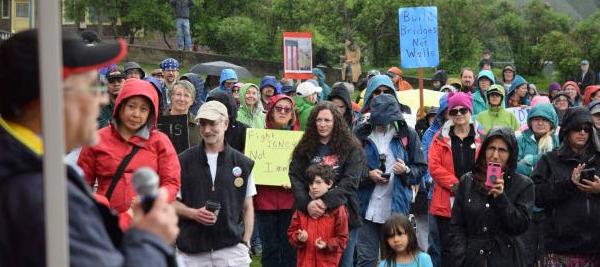
 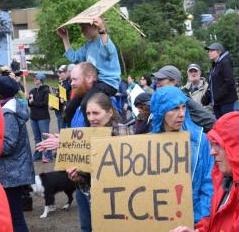
Actions in Canada
Quebec Border Caravan in Roxham, QC

 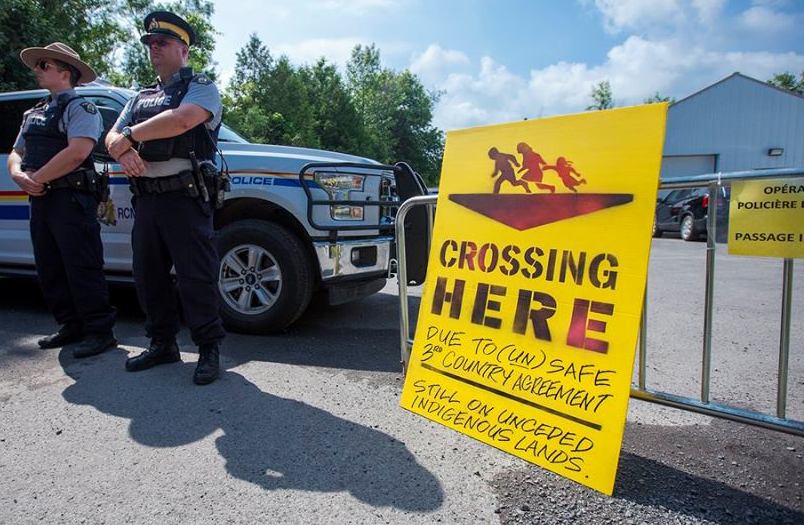
Huntingdon, QC; Sutton, QC; Dunham, QC
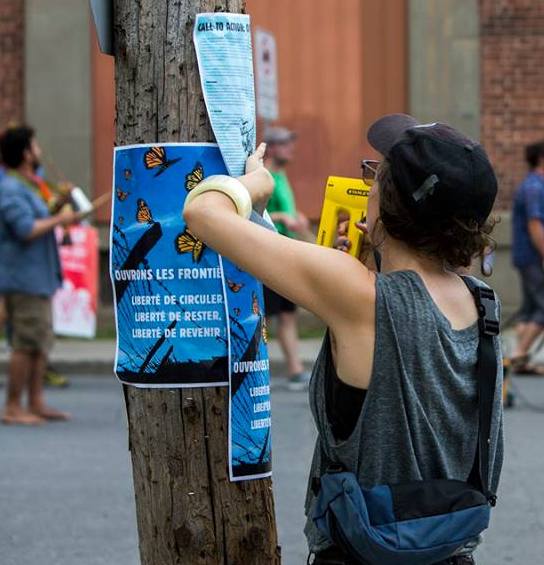 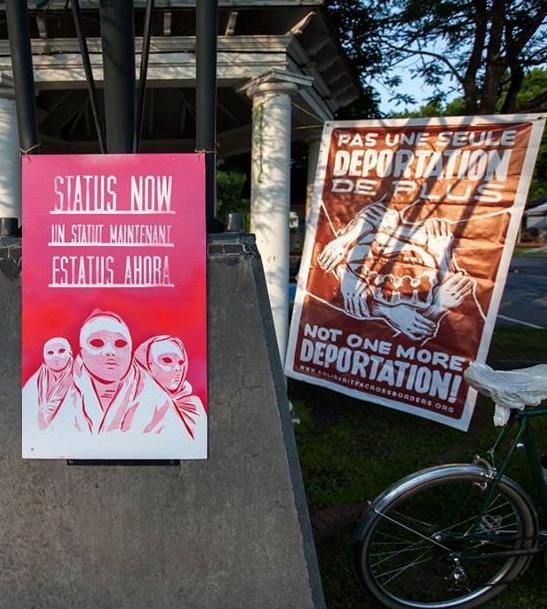 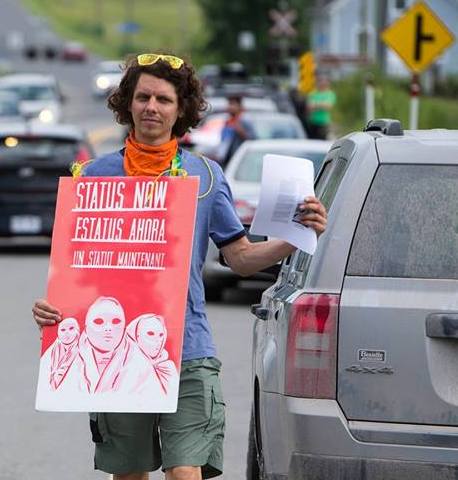
Ottawa, ON

 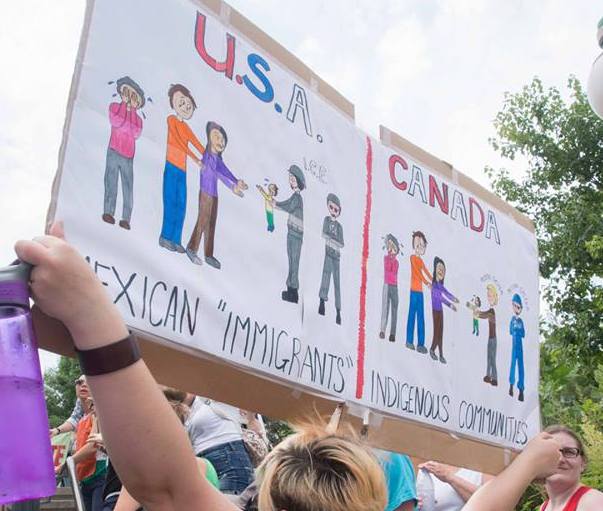 
Toronto, ON


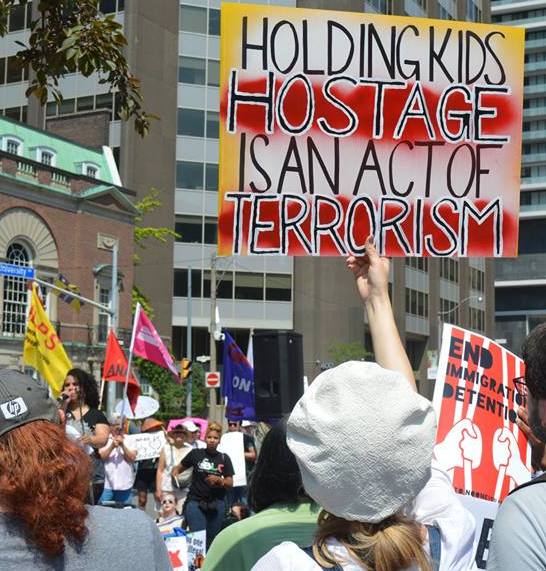 
Hamilton, ON
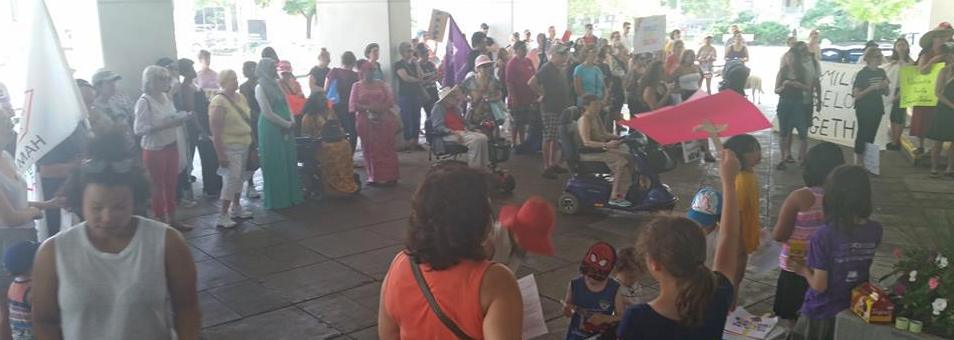
Kitchener-Waterloo, ON
  
Guelph, ON

London, ON

Winnipeg, MB
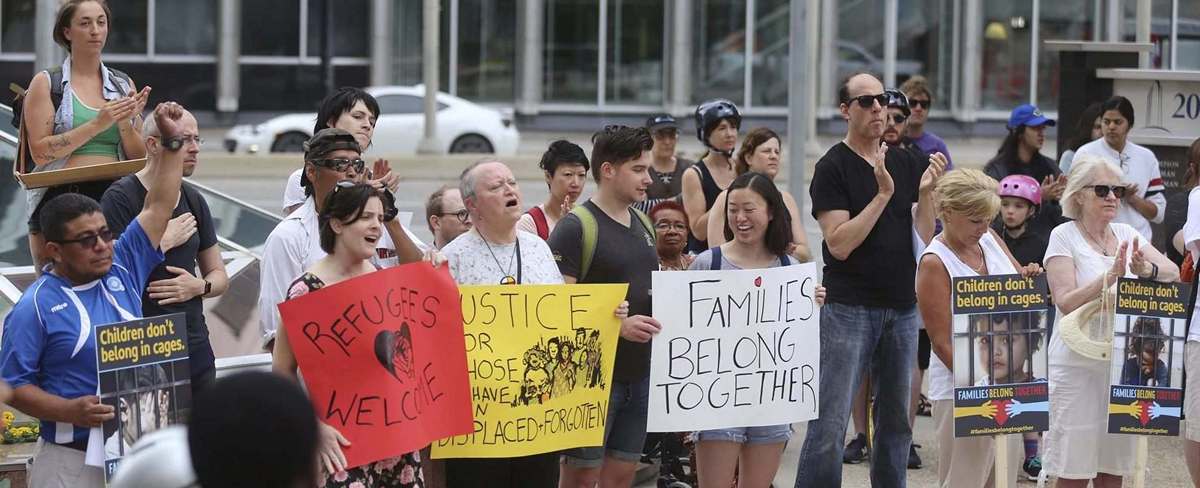
Edmonton, AB

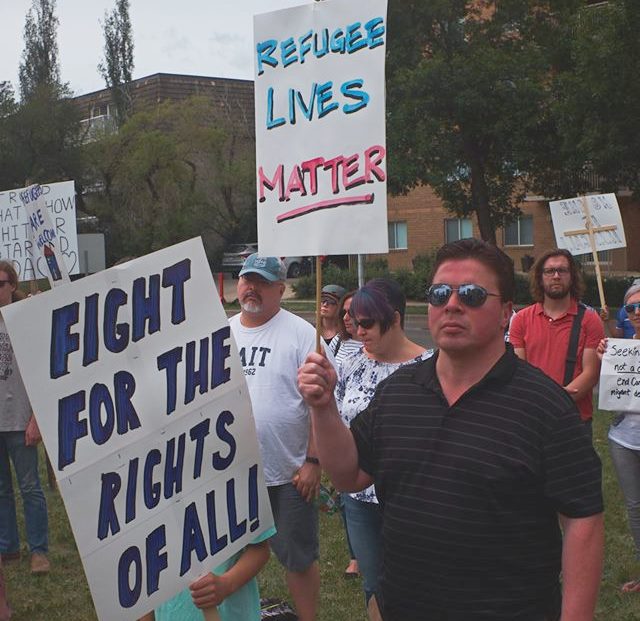 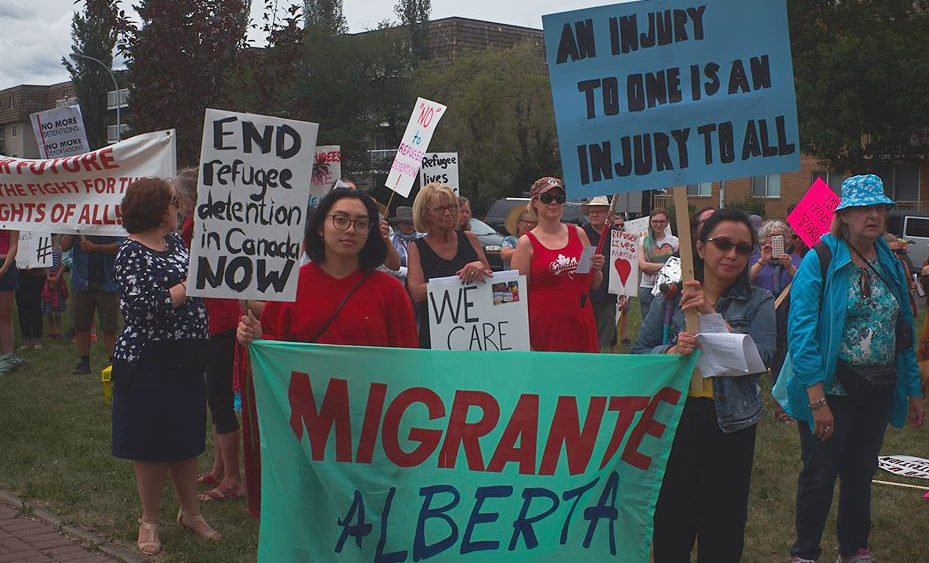
Lethbridge, AB

Victoria, BC


Contending Authorities Contribute to
Civil War Danger
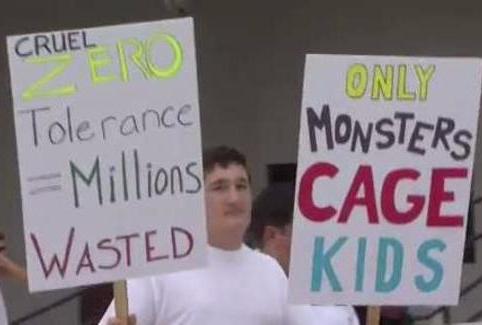 Seventeen states, including
California, Illinois, New
York
and Washington, as well as Washington, DC filed a lawsuit
against the federal government on June 25. It seeks to force the
Trump administration to reunite more than 2,000 children with
their parents. The lawsuit is the first one by states over the
"zero tolerance" policy to criminalize all entering the country
and separate children from their parents. The suit says the
federal government is acting in violation of the constitutional
rights of immigrants and refugees, particularly due process
rights, and is illegally inflicting trauma on children. Attorney
Generals for California, Washington, and Massachusetts are
leading the group. New York was to file its own lawsuit but
instead joined this one. The rest of the states are: Maryland,
Oregon, New Mexico, Pennsylvania, New Jersey, Iowa, Minnesota,
Rhode Island, Virginia, Vermont, North Carolina and Delaware. Seventeen states, including
California, Illinois, New
York
and Washington, as well as Washington, DC filed a lawsuit
against the federal government on June 25. It seeks to force the
Trump administration to reunite more than 2,000 children with
their parents. The lawsuit is the first one by states over the
"zero tolerance" policy to criminalize all entering the country
and separate children from their parents. The suit says the
federal government is acting in violation of the constitutional
rights of immigrants and refugees, particularly due process
rights, and is illegally inflicting trauma on children. Attorney
Generals for California, Washington, and Massachusetts are
leading the group. New York was to file its own lawsuit but
instead joined this one. The rest of the states are: Maryland,
Oregon, New Mexico, Pennsylvania, New Jersey, Iowa, Minnesota,
Rhode Island, Virginia, Vermont, North Carolina and Delaware.
The following day, addressing a class action lawsuit
filed
earlier by the American Civil Liberties Union (ACLU), a federal
court ruled that Trump is required to reunite all the separated
families within thirty days and within 14 days for children under
five. Nonetheless, the lawsuit by the states is being pursued.
This is an indication of the intensifying conflicts within the
ruling circles as they strive for power -- and the control of the
many policing agencies that power requires.
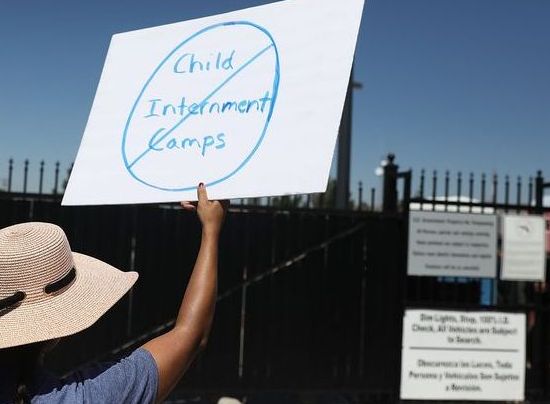 Part of what is at stake is whether
the federal
government
can dictate to the states, especially the large ones, on matters
of policing. The suit is taking place at a time many of these
same states are refusing to send National Guards to the southern border
as
demanded by Trump, and where some, like New York and California
have sanctuary laws, blocking local law enforcement from
cooperating with federal agents, like Immigration and Customs
Enforcement (ICE), on certain matters. In this case, care and
detention of children and refugees is also at issue. Many of the
detention centres run by the federal government, for example, are
in violation of state laws concerning licensing, safety and
medical requirements for housing children. Part of what is at stake is whether
the federal
government
can dictate to the states, especially the large ones, on matters
of policing. The suit is taking place at a time many of these
same states are refusing to send National Guards to the southern border
as
demanded by Trump, and where some, like New York and California
have sanctuary laws, blocking local law enforcement from
cooperating with federal agents, like Immigration and Customs
Enforcement (ICE), on certain matters. In this case, care and
detention of children and refugees is also at issue. Many of the
detention centres run by the federal government, for example, are
in violation of state laws concerning licensing, safety and
medical requirements for housing children.
The states are contending with the federal government
as to
who will have authority in a situation where rule of law has
effectively been eliminated -- as the actions surrounding
immigration show. The federal government is acting with impunity,
completely against human rights law the U.S. is duty bound to
uphold. The states seem to think relying on the constitution will
resolve the conflict and hold the executive in check, but there
is no basis for that to be so. Indeed, it is the very
arrangements of the constitution that have enabled the executive
to increasingly usurp power and concentrate it in the office of
the president. As the oath of office of the president states, he
is to "faithfully execute the Office of President of the United
States." Short of impeachment, the president can utilize the
police powers of the executive as he sees fit. It has reached the
point now where these police powers are all that remain of the
public authority, with any semblance of government providing for
the public good and upholding rule of law eliminated. This is
evident not only on matters of immigration but more broadly on
issues of the rights of workers, women, students, issues of
government racism and inequality, etc.
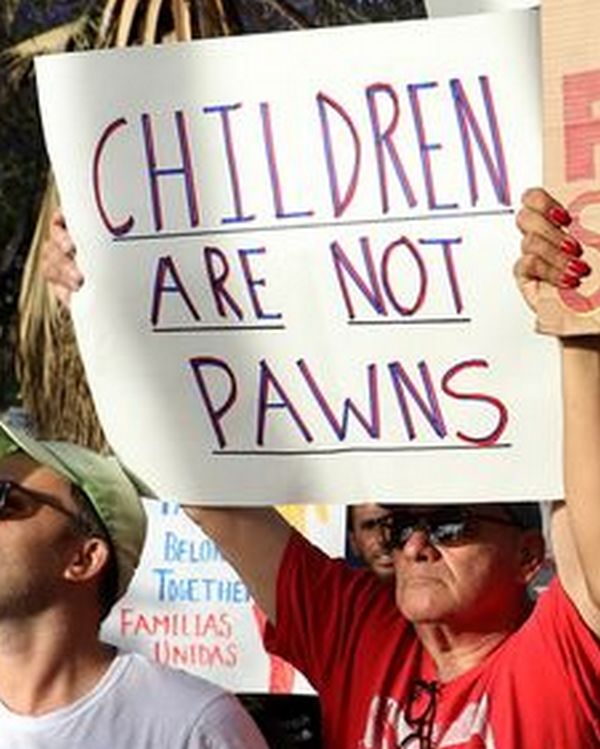 However, such a situation
undermines the legitimacy of
the
federal government in the eyes of the people, including its
ability to have a monopoly on the use of force. It creates
conditions of contending authorities, in this case those of the
federal government and the states. In a situation where many of
these states, like New York and California, could be countries in
their own right, such contention means the conditions of civil
war always brewing under the surface could break out into open
violence. In the current conflict, whether Trump adheres to the
federal court ruling, whether the states persist and achieve a
ruling of their own, whether National Guards will adhere to the
will of the governors or Trump, are all indications of the
seriousness the conditions of civil war are posing. However, such a situation
undermines the legitimacy of
the
federal government in the eyes of the people, including its
ability to have a monopoly on the use of force. It creates
conditions of contending authorities, in this case those of the
federal government and the states. In a situation where many of
these states, like New York and California, could be countries in
their own right, such contention means the conditions of civil
war always brewing under the surface could break out into open
violence. In the current conflict, whether Trump adheres to the
federal court ruling, whether the states persist and achieve a
ruling of their own, whether National Guards will adhere to the
will of the governors or Trump, are all indications of the
seriousness the conditions of civil war are posing.
The vying factions among the ruling elite would like to
see
people line up behind one or the other faction so as to block the
large majority, working people, from themselves gaining political
power. But the many actions are already indicating that the
people do not accept such a role. They are striving for a new
direction. The alternative is for a government that upholds the
rights of all -- for an anti-war government and peace economy.
Such a direction can resolve the wars abroad and conflicts at
home in the interests of the people.

Second Anniversary of Brexit Referendum
Hysteria and Division Surround Brexit
Votes and
Negotiations
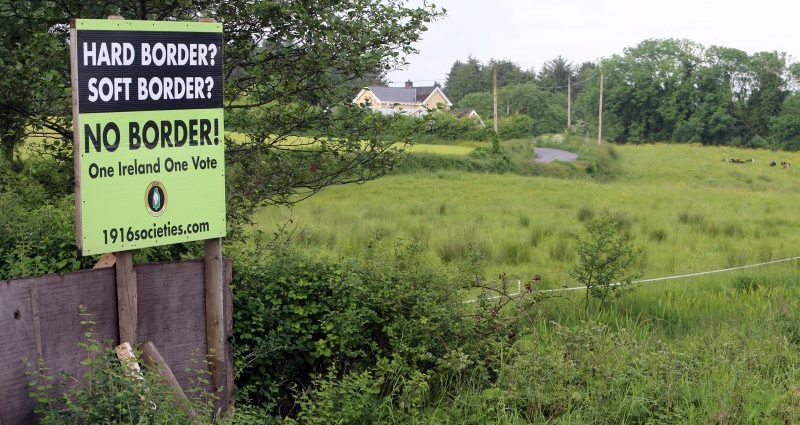
June 23 marked the second
anniversary of the referendum called by then Prime Minister David
Cameron on the
issue of whether to Remain in or Leave the European Union. June 8
was also the first anniversary of the snap election called by
current Prime Minister Theresa May that was supposed to provide strong
and stable
government after Cameron resigned following the Leave result in
the referendum.
The referendum was not designed to resolve the question
of
whether to remain in or leave the European Union. Nor was this the
issue
facing the working people of Britain. The problems facing society
were not to be laid solely at the feet of either leaving or
remaining in the European Union.
Neither are the problems facing society going to be
resolved
through a "no deal" Brexit, a "bad deal" Brexit, or a "soft
Brexit." There is anarchy in the realm of production and in the
global economy at large. A "sovereign economy" of Britain, which
"takes back control" from the European Union, is a phantasm. The global
imperialists dominate the economy.
When questions come up such as "Who owns Britain?"
analysts
estimate that no less than half of companies in Britain are part
of international cartels, monopolies or conglomerates.[1] This underscores
whose interests
are served by neo-liberal global trade in today's world. The big
powers in control of the European Union are in sharp
contradiction with one another and whether or not Britain is in
or out, what it wants is to "have its cake and eat it
too." What the peoples of all of Europe desire, Britain included,
is their own control over the direction of their economies.
The Prime Minister of Britain, Theresa May, and her
coterie
have become completely bogged down in the issue of leaving the
European Union with talk of a "rules-based international order."
The hard fact is that this is pie-in-the-sky. Even within the
Conservative Party, competing private interests are such that they
cannot reach consensus "through dialogue." The financial
oligarchy of the City of London is amongst the most powerful in
the world as are the British armament manufacturers which aim to
make Britain the centre of a trade in war.
The working people of England, Ireland, Scotland and
Wales
are very much involved in the kind of arrangements they think
will benefit the people. Keeping them in check is also one of
the major preoccupations of the ruling elites in both Britain and
the European Union, which is itself undergoing a profound crisis
as a result of the contradictions within its ranks over who is to
benefit from trade-relations and decision-making processes.
Based on an editorial in Workers' Weekly, on-line
newspaper
of the Revolutionary Communist Party of Britain
(Marxist-Leninist), June 23, 2018.
Note
1. See article "Who
owns
Britain?" in
openDemocracy.

British Government Cannot Reconcile Its Anti-Social and
Pro-War Direction with the Needs of the People
- Workers' Weekly -

This week saw another chain of events that show how
Theresa May's government cannot reconcile its anti-social and
pro-war direction with the well-being and needs of the people. On
June 17, Theresa May announced that the National Health Service (NHS)
in England is to get
an extra £20 billion a year by 2023 as a "70th birthday present."
By June 19, after criticism from her military chiefs, she was
boasting to visiting NATO Secretary General Jens Stoltenberg that
"we are the biggest defence budget in Europe," and "we will
continue to contribute in a whole variety of ways across
conventional, cyber and nuclear capabilities."
This statement on June 15, by the Prime Minister on the
NHS had
no further detail and came at a time that the government said it
would launch a Green Paper detailing future spending on health
and social care. Of course, there was no mention of the further
investment desperately needed in the NHS in Scotland, Wales and
the north of Ireland for which the Westminster government has
overall funding responsibility. Neither was there any recognition
of the depth of the crisis in the NHS caused by the neo-liberal
direction driven by the big health corporations and state
institutions under their control, or the 3 per cent "efficiency
savings" -- cuts that are imposed on all NHS Trusts every year.
Commenting on the interview, the BBC report said that the £114
billion
NHS budget in England "will rise by an average of 3.4 per cent
annually -- but that is still less than the 3.7 per cent average
rise the NHS has had since 1948. The prime minister said in the
interview that this would be funded partly by a 'Brexit
dividend,' but also hinted at tax rises." This brought comments
in Parliament on June 18, especially from Leader of the
Opposition Jeremy Corbyn, who at PMQs [the weekly Prime Minister's
Questions Session -- TML Ed. Note]
questioned
the
"Brexit
dividend"
and
asked,
"Which
taxes
are
going
up
and
for whom?"
It also was reported in the Financial Times and
other
papers that Theresa May had told "stunned military chiefs" and
defence secretary Gavin Williamson that "the MoD [Ministry of Defence]
would need to
make cuts and end having a full spectrum of military
capabilities." The reports said this sent "shockwaves through the
Ministry of Defence" that the Treasury will not find any extra
money for the armed forces when a review of British capabilities
concludes in the autumn.
Then on June 17, Jens Stoltenberg, who was visiting
Britain
ahead of next month's NATO summit in Brussels with government
leaders, called on Britain to maintain its role as one of the
world's biggest military spenders. He also met with Theresa May
and held a joint press conference with her where May said that
"the reports that you have read are not correct." She said that
Britain will continue to be that leading contributor to the
alliance but also a leading "defence nation" and will continue to
spend 2 per cent of GDP on the military.
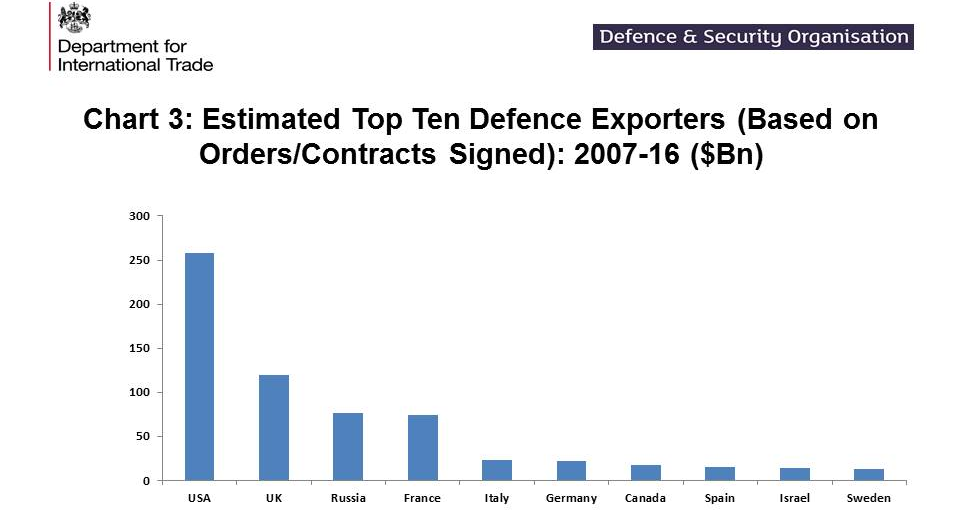
The NHS is a vital part of the well-being to the people
in a
socialized economy. This fact has to be recognized and not
diminished to one of being a "cost" to the economy to be played
off against the ambitions of the ruling elite to interfere in
other countries and go to war. Health workers create value in the
socialized economy. The huge value they produce needs to be
claimed by the government in large part from the monopolies and
oligopolies that consume and profit from this value in having a
healthy workforce. The crisis of NHS funding shows that the NHS
cannot be reconciled with such an archaic tax system that does
not claim this value. It also cannot be reconciled with the
pro-war ambitions of the imperialist ruling elite, and their
striving to retain British military interference and carry out
wars of aggression with the empire-building aim of making Britain
a "leading power" in the world to serve their interests and the
interests of the imperialist system of states.

PREVIOUS
ISSUES | HOME
Website: www.cpcml.ca
Email: editor@cpcml.ca
|

